
Zettelgarden
Intelligent zettelkasten where AI agents help you capture, process, and recall knowledge seamlessly
Stars: 152
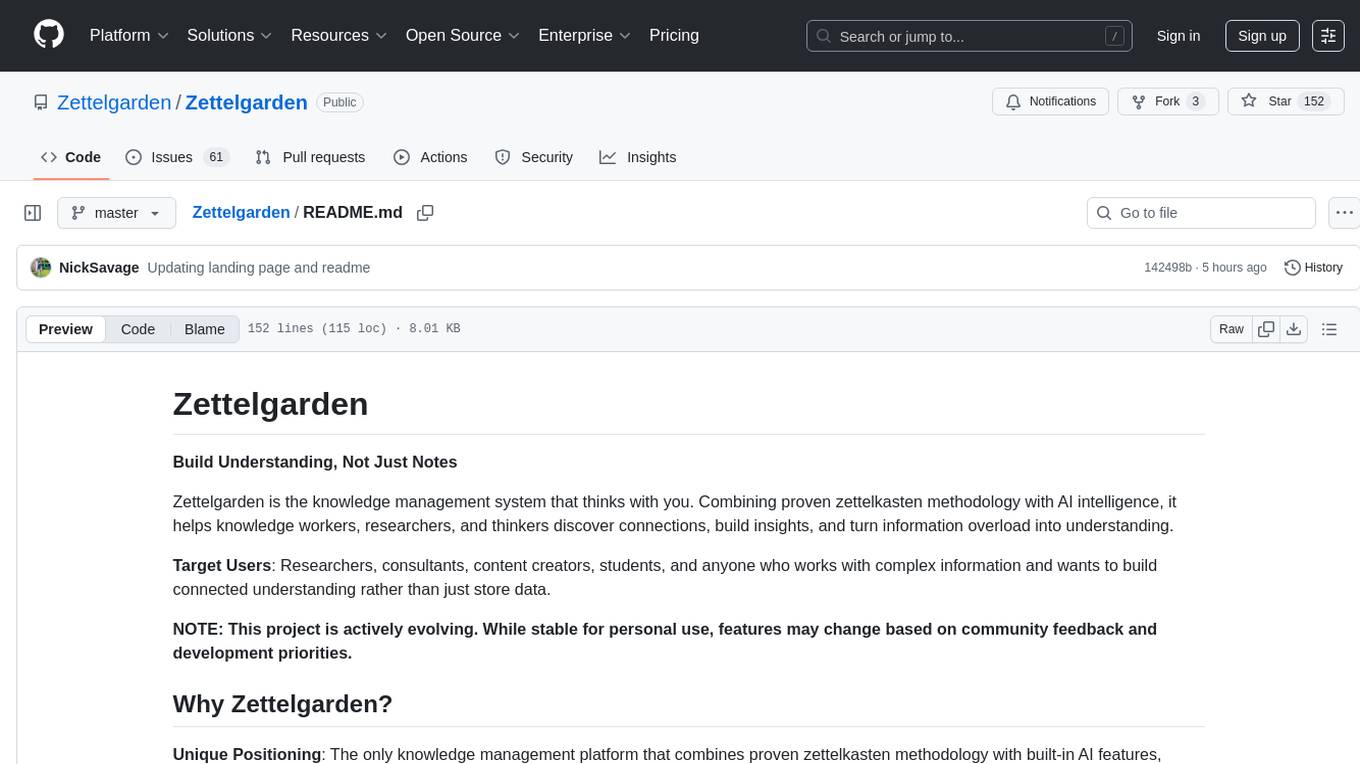
Zettelgarden is a human-centric, open-source personal knowledge management system that helps users develop and maintain their understanding of the world. It focuses on creating and connecting atomic notes, thoughtful AI integration, and scalability from personal notes to company knowledge bases. The project is actively evolving, with features subject to change based on community feedback and development priorities.
README:
Build Understanding, Not Just Notes
Zettelgarden is the knowledge management system that thinks with you. Combining proven zettelkasten methodology with AI intelligence, it helps knowledge workers, researchers, and thinkers discover connections, build insights, and turn information overload into understanding.
Target Users: Researchers, consultants, content creators, students, and anyone who works with complex information and wants to build connected understanding rather than just store data.
NOTE: This project is actively evolving. While stable for personal use, features may change based on community feedback and development priorities.
Unique Positioning: The only knowledge management platform that combines proven zettelkasten methodology with built-in AI features, offering web accessibility with self-hosting options.
- vs. Obsidian: Web-native (no desktop app required), built-in AI features, mobile-optimized
- vs. Notion: Purpose-built for knowledge connection, faster search, academic methodology
- vs. Roam: Modern interface, AI integration, better performance, open source
- vs. AI-only tools: AI augments proven methodology instead of replacing it
- Human-Centric AI: AI augments your thinking rather than replacing it
- Proven Methodology: Based on the zettelkasten system used by Darwin, Luhmann, and other great thinkers
- Connected Knowledge: Every idea links to every other idea in a living knowledge graph
- Privacy First: Self-host for complete control or use secure cloud hosting
Watch our demo video to see Zettelgarden in action and learn about its key features.
You can also try Zettelgarden directly at zettelgarden.com using our demo account:
- Email: [email protected]
- Password: demo
- Atomic Cards: Markdown-supported notes with unique identifiers for reliable linking
-
Bidirectional Linking: Automatic
[[card-title]]syntax with backlink detection and display - Task Management: Integrated todo system with scheduling, priorities, and recurring patterns
- File Attachments: Upload and organize PDFs, images, and documents with S3-compatible storage
- Templates: Reusable card templates with variable substitution
- Hierarchical Organization: Parent-child card relationships with multiple view modes
- AI Chat Agents: Converse with your knowledge base using context-aware AI that can search, analyze, and synthesize information
- Vector Search: Semantic similarity search using pgvector embeddings for content discovery beyond keywords
- Entity Recognition: Automatic extraction and linking of people, places, organizations, and concepts using LLM-powered NLP
- Content Analysis: AI-generated summaries, theme extraction, and insight generation with citation integrity
- Smart Discovery: Related content recommendations and pattern recognition across your knowledge graph
-
Multi-Modal Search:
- Full-text search with Typesense integration
- Vector/semantic search using OpenAI-compatible embeddings
- Boolean operators and advanced filters
- Real-time search results with highlighting
- Entity-Based Navigation: Search and filter by automatically recognized entities
- Starred Searches: Save and organize frequently used search queries
- Backlink Analysis: Automatic bidirectional relationship tracking
- Self-Hosting: Docker-based deployment with PostgreSQL + pgvector for complete data ownership
- Web-Native: Full functionality in browser with Progressive Web App capabilities
- API Access: RESTful API with JWT authentication for programmatic integration
- Real-Time Sync: WebSocket connections with optimistic updates across sessions
- Data Portability: Export to JSON, Markdown, CSV formats with migration tools
- Keyboard Shortcuts: Efficient power-user workflows (c=create, s=search, t=tasks)
- Data Ownership: Complete control with self-hosting option or secure cloud hosting
- Encryption: TLS for transport, AES for storage
- No Vendor Lock-in: Export data anytime, open source transparency
- Privacy-First AI: Optional AI features, no data mining, model choices
Built with modern, scalable technologies optimized for both performance and AI capabilities:
- Framework: React 18 with TypeScript for type safety
- Build Tool: Vite for fast development and optimized builds
- Styling: Tailwind CSS with custom design system
- State Management: React Context API with optimistic updates
- Real-time: WebSocket integration for live synchronization
- PWA: Service worker with offline capabilities and caching
-
Language: Go with
net/httpfor high-performance HTTP server - Database: PostgreSQL with pgvector extension for vector storage
- Search Engine: Typesense for full-text search with built-in ML capabilities
- Authentication: JWT-based with middleware pipeline
- File Storage: S3-compatible storage (AWS S3, MinIO, etc.)
- API Design: RESTful endpoints with JSON responses
- Embeddings: OpenAI-compatible API integration for text embeddings
- Vector Search: pgvector with cosine similarity for semantic search
- Entity Recognition: LLM-powered Named Entity Recognition pipeline
- Content Analysis: Structured prompting for summaries and insights
- Search Integration: Hybrid search combining full-text (Typesense) and vector (pgvector)
- Model Flexibility: Configurable LLM endpoints (OpenAI, Anthropic, local models)
- Containerization: Docker and Docker Compose for easy deployment
- Database Migrations: SQL migration system with version control
- Monitoring: Structured logging with configurable levels
- Security: TLS/SSL, input validation, SQL injection protection
- Backup: Automated database backups with point-in-time recovery
- Framework: Flask for lightweight SMTP service
- Purpose: User notifications, password resets, subscription management
- Integration: RESTful API for backend communication
- Try the Demo: Visit zettelgarden.com and use demo credentials ([email protected] / demo)
- Cloud Hosting: Sign up for free at zettelgarden.com with 30-day PRO trial
- Self-Hosting: Deploy with Docker for complete data ownership
- Docker and Docker Compose
- PostgreSQL with pgvector extension
- Typesense search server
- S3-compatible storage (optional)
- OpenAI-compatible API key for AI features (optional)
See our getting started guide for detailed setup instructions. (Coming soon!)
For Researchers: Organize literature, track citations, discover cross-study connections For Consultants: Build client knowledge bases, synthesize industry insights, develop frameworks For Content Creators: Research management, idea development, content planning workflows For Students: Note-taking that builds understanding, concept mapping, exam preparation
- Free: Core zettelkasten features (cards, linking, tasks, basic search)
- PRO ($10/month, $100/year): AI features, vector search, entity recognition, content analysis
- Self-Hosting: Deploy the open source version with your own infrastructure
Zettelgarden is built in the open. Contributions and feedback are welcome. Please check our contribution guidelines.
Follow our blog and Nick Savage's Substack for detailed updates on development and new features.
For Tasks:
Click tags to check more tools for each tasksFor Jobs:
Alternative AI tools for Zettelgarden
Similar Open Source Tools

Zettelgarden
Zettelgarden is a human-centric, open-source personal knowledge management system that helps users develop and maintain their understanding of the world. It focuses on creating and connecting atomic notes, thoughtful AI integration, and scalability from personal notes to company knowledge bases. The project is actively evolving, with features subject to change based on community feedback and development priorities.
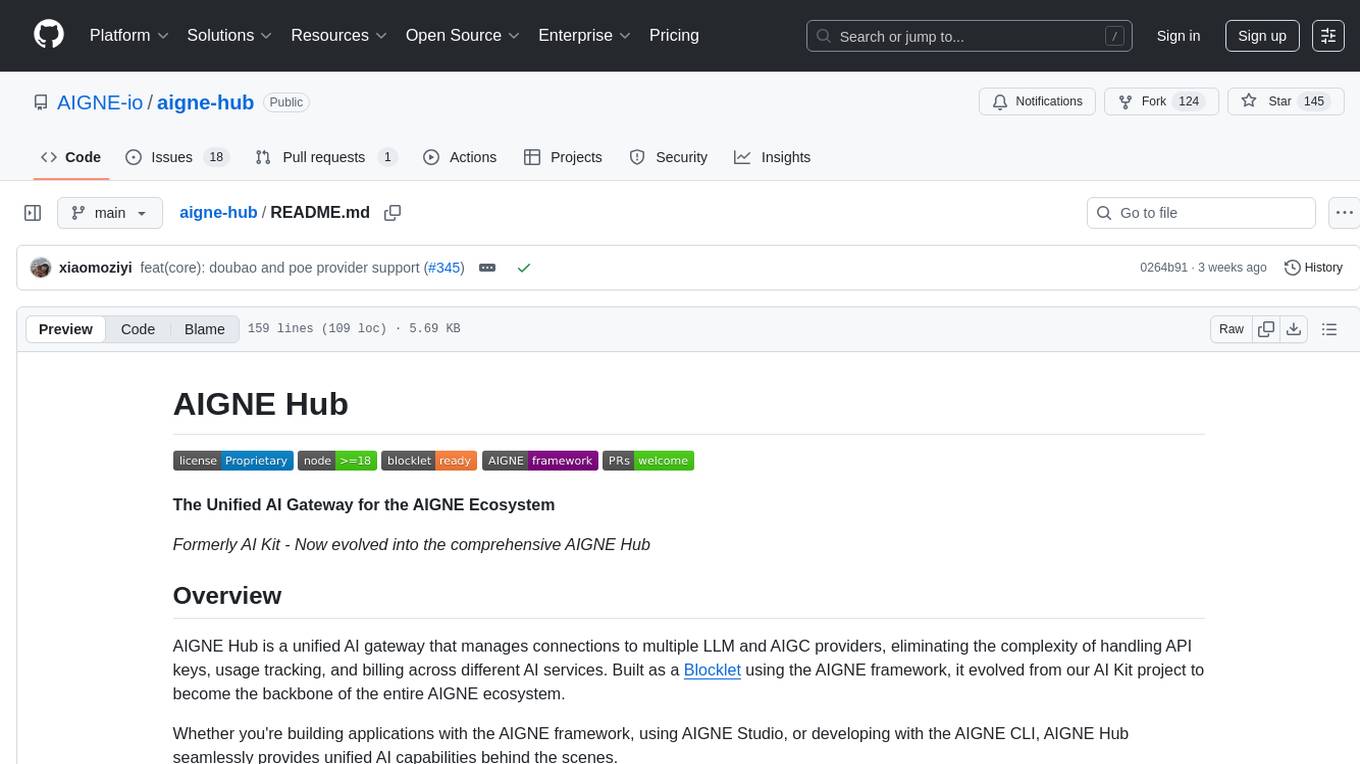
aigne-hub
AIGNE Hub is a unified AI gateway that manages connections to multiple LLM and AIGC providers, eliminating the complexity of handling API keys, usage tracking, and billing across different AI services. It provides self-hosting capabilities, multi-provider management, unified security, usage analytics, flexible billing, and seamless integration with the AIGNE framework. The tool supports various AI providers and deployment scenarios, catering to both enterprise self-hosting and service provider modes. Users can easily deploy and configure AI providers, enable billing, and utilize core capabilities such as chat completions, image generation, embeddings, and RESTful APIs. AIGNE Hub ensures secure access, encrypted API key management, user permissions, and audit logging. Built with modern technologies like AIGNE Framework, Node.js, TypeScript, React, SQLite, and Blocklet for cloud-native deployment.
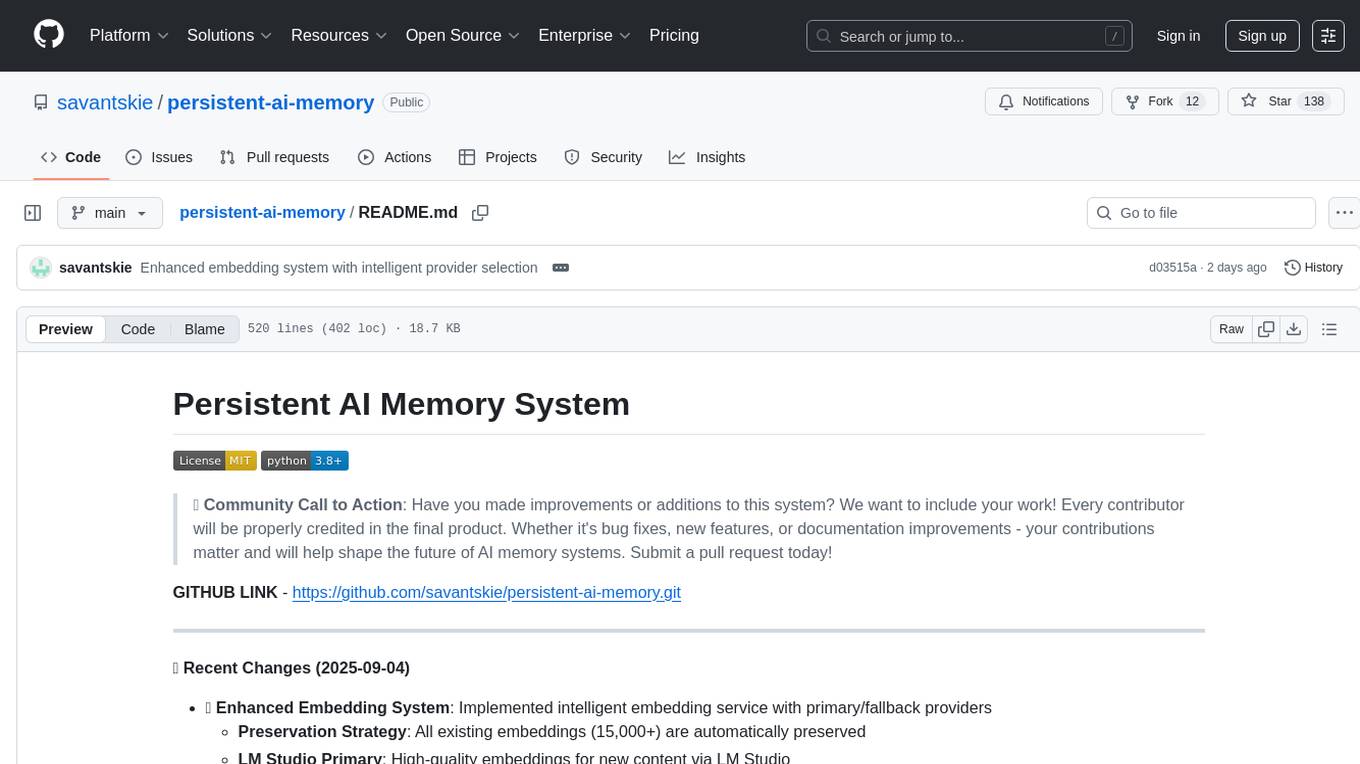
persistent-ai-memory
Persistent AI Memory System is a comprehensive tool that offers persistent, searchable storage for AI assistants. It includes features like conversation tracking, MCP tool call logging, and intelligent scheduling. The system supports multiple databases, provides enhanced memory management, and offers various tools for memory operations, schedule management, and system health checks. It also integrates with various platforms like LM Studio, VS Code, Koboldcpp, Ollama, and more. The system is designed to be modular, platform-agnostic, and scalable, allowing users to handle large conversation histories efficiently.
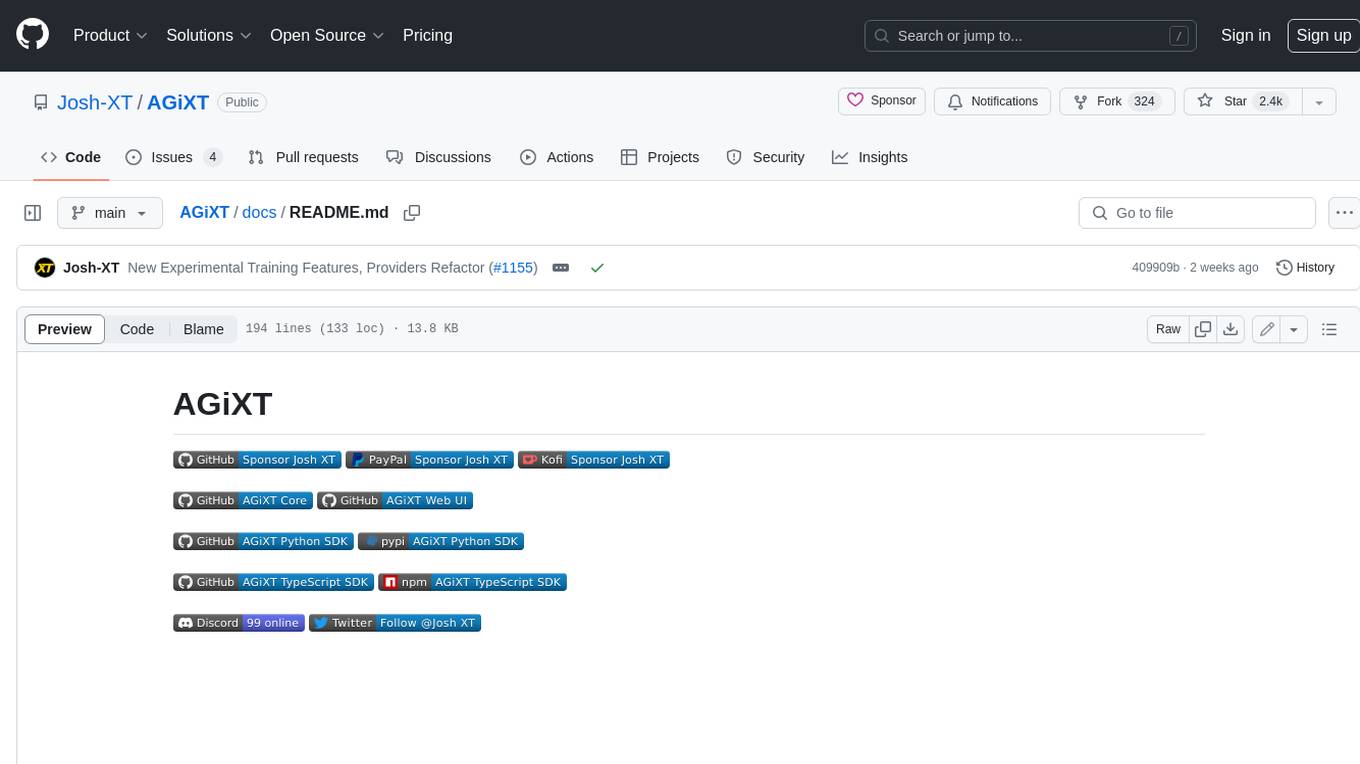
AGiXT
AGiXT is a dynamic Artificial Intelligence Automation Platform engineered to orchestrate efficient AI instruction management and task execution across a multitude of providers. Our solution infuses adaptive memory handling with a broad spectrum of commands to enhance AI's understanding and responsiveness, leading to improved task completion. The platform's smart features, like Smart Instruct and Smart Chat, seamlessly integrate web search, planning strategies, and conversation continuity, transforming the interaction between users and AI. By leveraging a powerful plugin system that includes web browsing and command execution, AGiXT stands as a versatile bridge between AI models and users. With an expanding roster of AI providers, code evaluation capabilities, comprehensive chain management, and platform interoperability, AGiXT is consistently evolving to drive a multitude of applications, affirming its place at the forefront of AI technology.
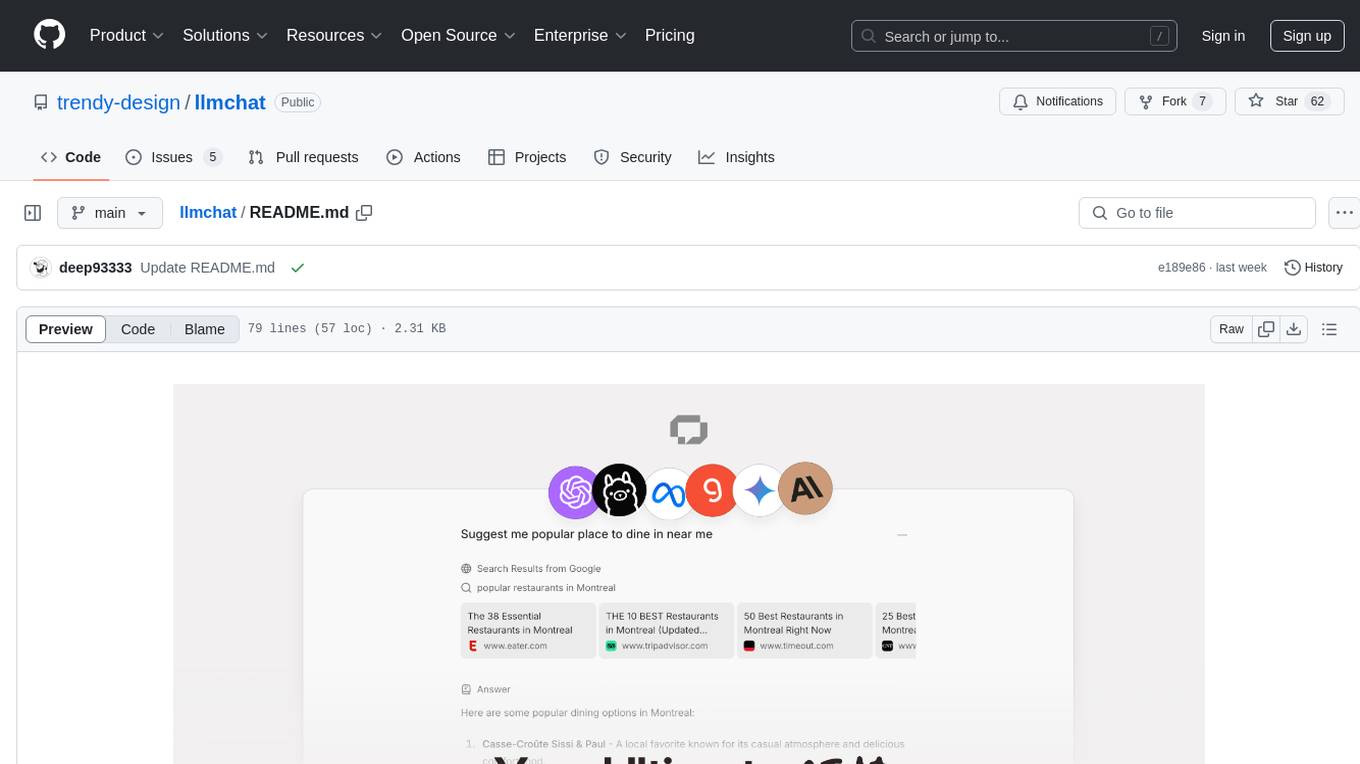
llmchat
LLMChat is an all-in-one AI chat interface that supports multiple language models, offers a plugin library for enhanced functionality, enables web search capabilities, allows customization of AI assistants, provides text-to-speech conversion, ensures secure local data storage, and facilitates data import/export. It also includes features like knowledge spaces, prompt library, personalization, and can be installed as a Progressive Web App (PWA). The tech stack includes Next.js, TypeScript, Pglite, LangChain, Zustand, React Query, Supabase, Tailwind CSS, Framer Motion, Shadcn, and Tiptap. The roadmap includes upcoming features like speech-to-text and knowledge spaces.
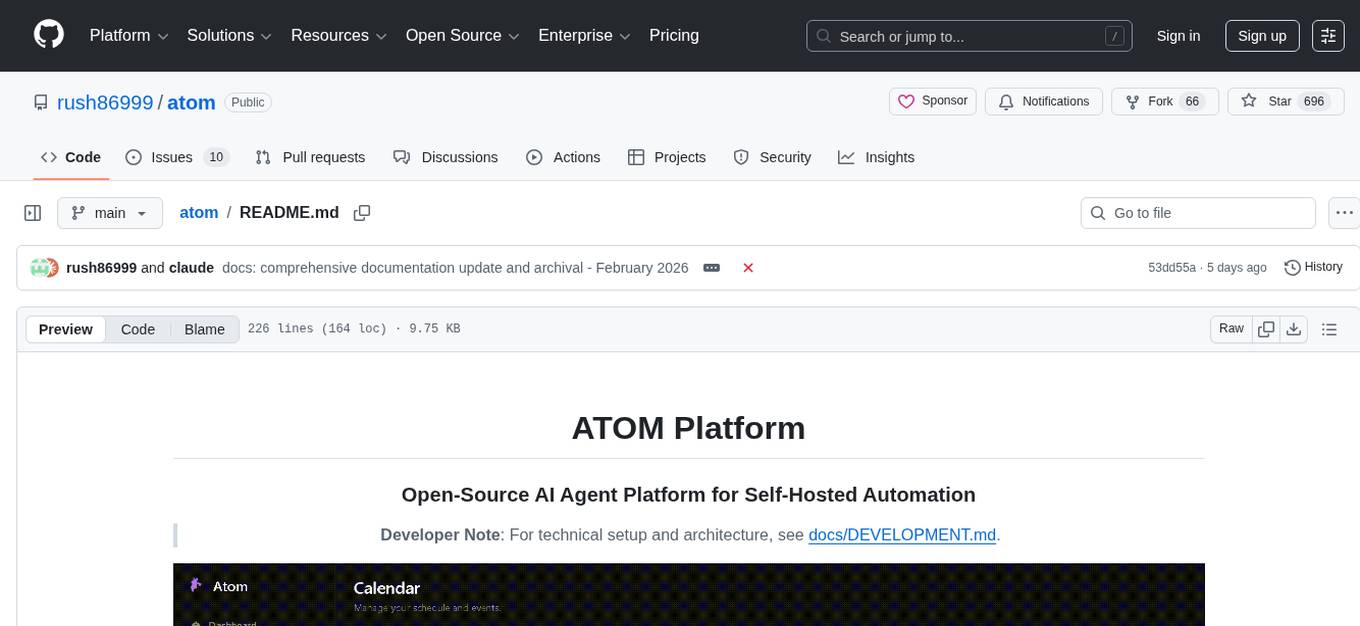
atom
Atom is an open-source, self-hosted AI agent platform that allows users to automate workflows by interacting with AI agents. Users can speak or type requests, and Atom's specialty agents can plan, verify, and execute complex workflows across various tech stacks. Unlike SaaS alternatives, Atom runs entirely on the user's infrastructure, ensuring data privacy. The platform offers features such as voice interface, specialty agents for sales, marketing, and engineering, browser and device automation, universal memory and context, agent governance system, deep integrations, dynamic skills, and more. Atom is designed for business automation, multi-agent workflows, and enterprise governance.
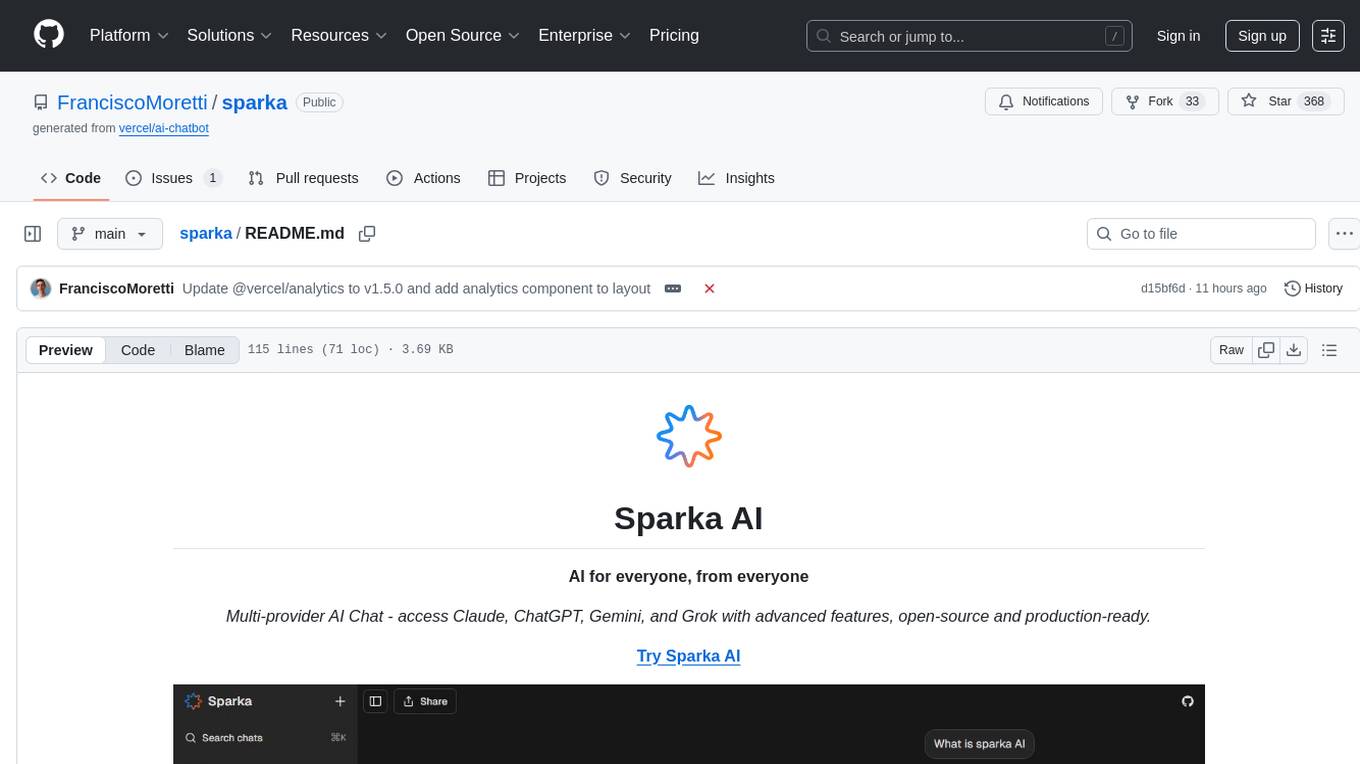
sparka
Sparka AI is a multi-provider AI chat tool that allows users to access various AI models like Claude, GPT-5, Gemini, and Grok through a single interface. It offers features such as document analysis, image generation, code execution, and research tools without the need for multiple subscriptions. The tool is open-source, production-ready, and provides capabilities for collaboration, secure authentication, attachment support, AI-powered image generation, syntax highlighting, resumable streams, chat branching, chat sharing, deep research, code execution, document creation, and web analytics. Built with modern technologies for scalability and performance, Sparka AI integrates with Vercel AI SDK, tRPC, Drizzle ORM, PostgreSQL, Redis, and AI SDK Gateway.
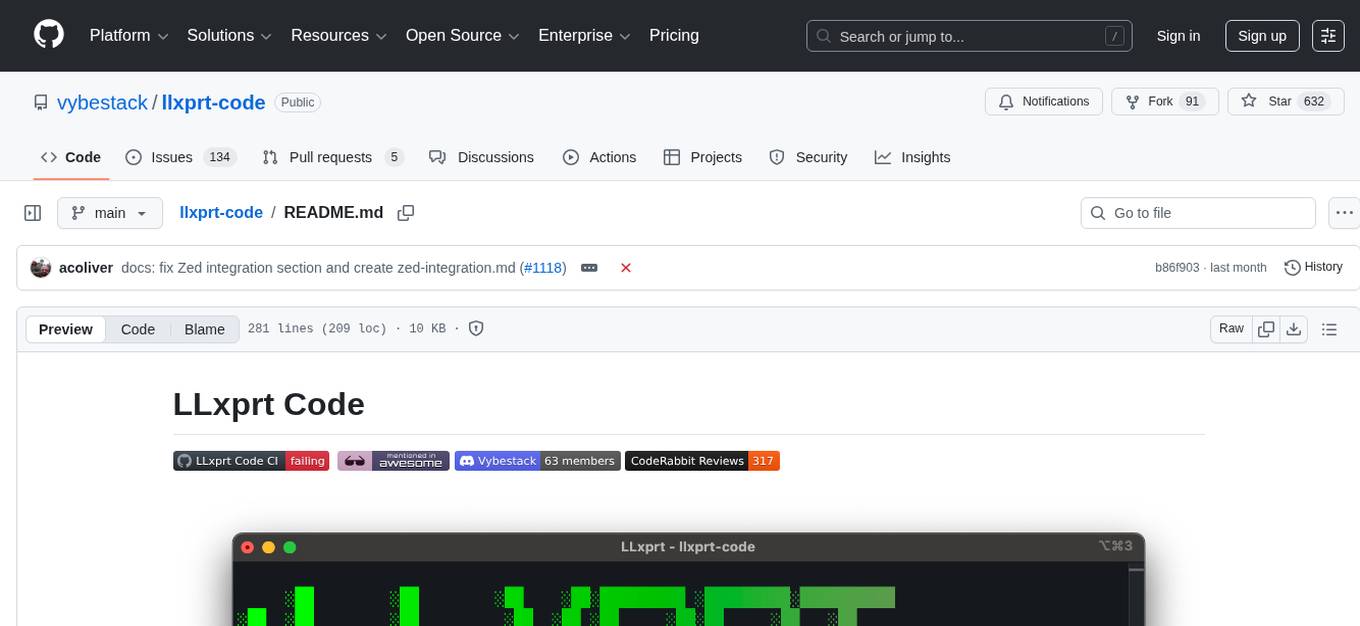
llxprt-code
LLxprt Code is an AI-powered coding assistant that works with any LLM provider, offering a command-line interface for querying and editing codebases, generating applications, and automating development workflows. It supports various subscriptions, provider flexibility, top open models, local model support, and a privacy-first approach. Users can interact with LLxprt Code in both interactive and non-interactive modes, leveraging features like subscription OAuth, multi-account failover, load balancer profiles, and extensive provider support. The tool also allows for the creation of advanced subagents for specialized tasks and integrates with the Zed editor for in-editor chat and code selection.
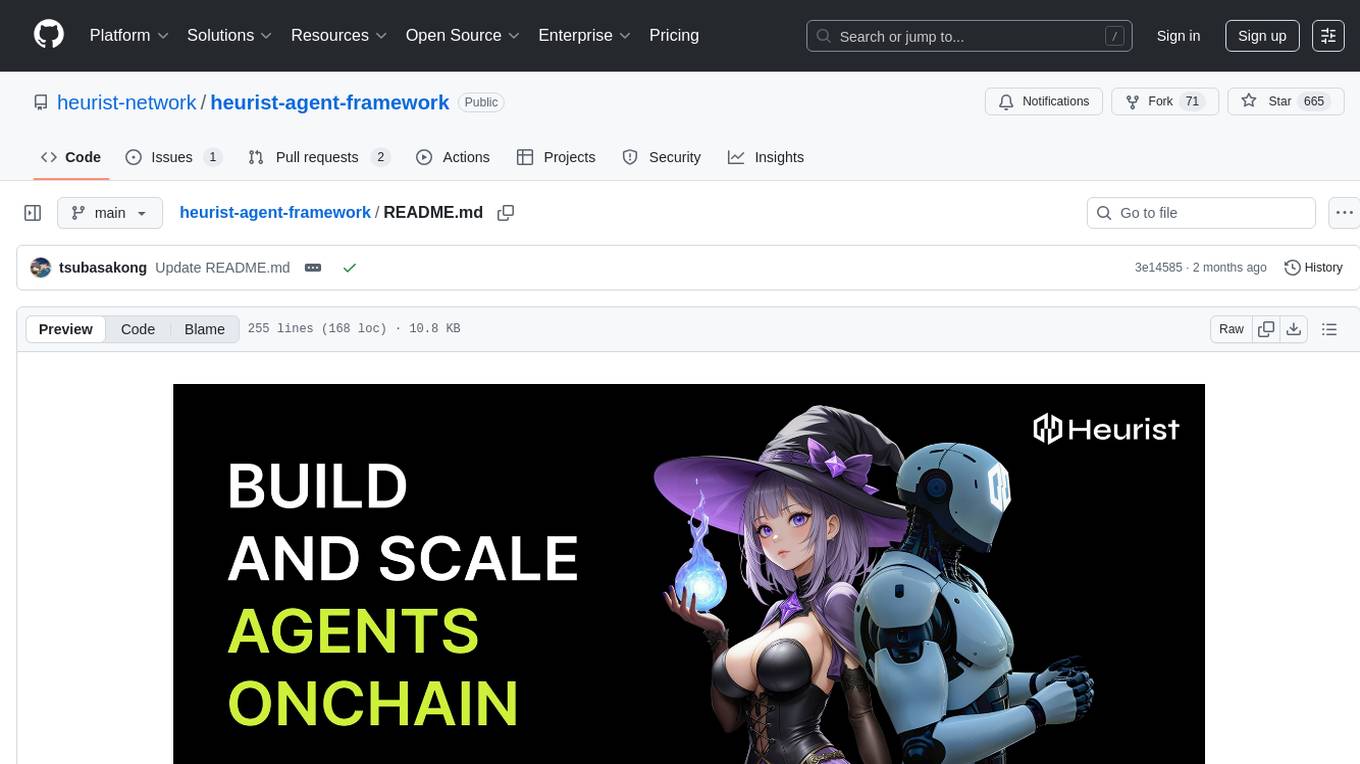
heurist-agent-framework
Heurist Agent Framework is a flexible multi-interface AI agent framework that allows processing text and voice messages, generating images and videos, interacting across multiple platforms, fetching and storing information in a knowledge base, accessing external APIs and tools, and composing complex workflows using Mesh Agents. It supports various platforms like Telegram, Discord, Twitter, Farcaster, REST API, and MCP. The framework is built on a modular architecture and provides core components, tools, workflows, and tool integration with MCP support.
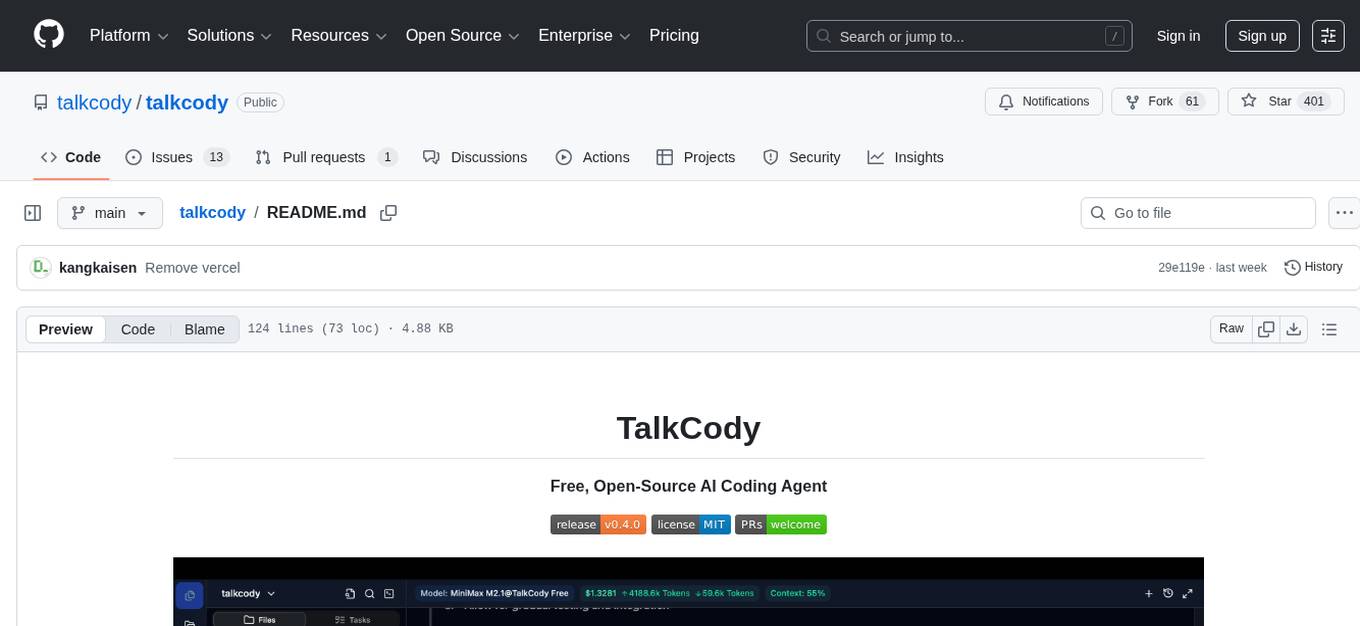
talkcody
TalkCody is a free, open-source AI coding agent designed for developers who value speed, cost, control, and privacy. It offers true freedom to use any AI model without vendor lock-in, maximum speed through unique four-level parallelism, and complete privacy as everything runs locally without leaving the user's machine. With professional-grade features like multimodal input support, MCP server compatibility, and a marketplace for agents and skills, TalkCody aims to enhance development productivity and flexibility.
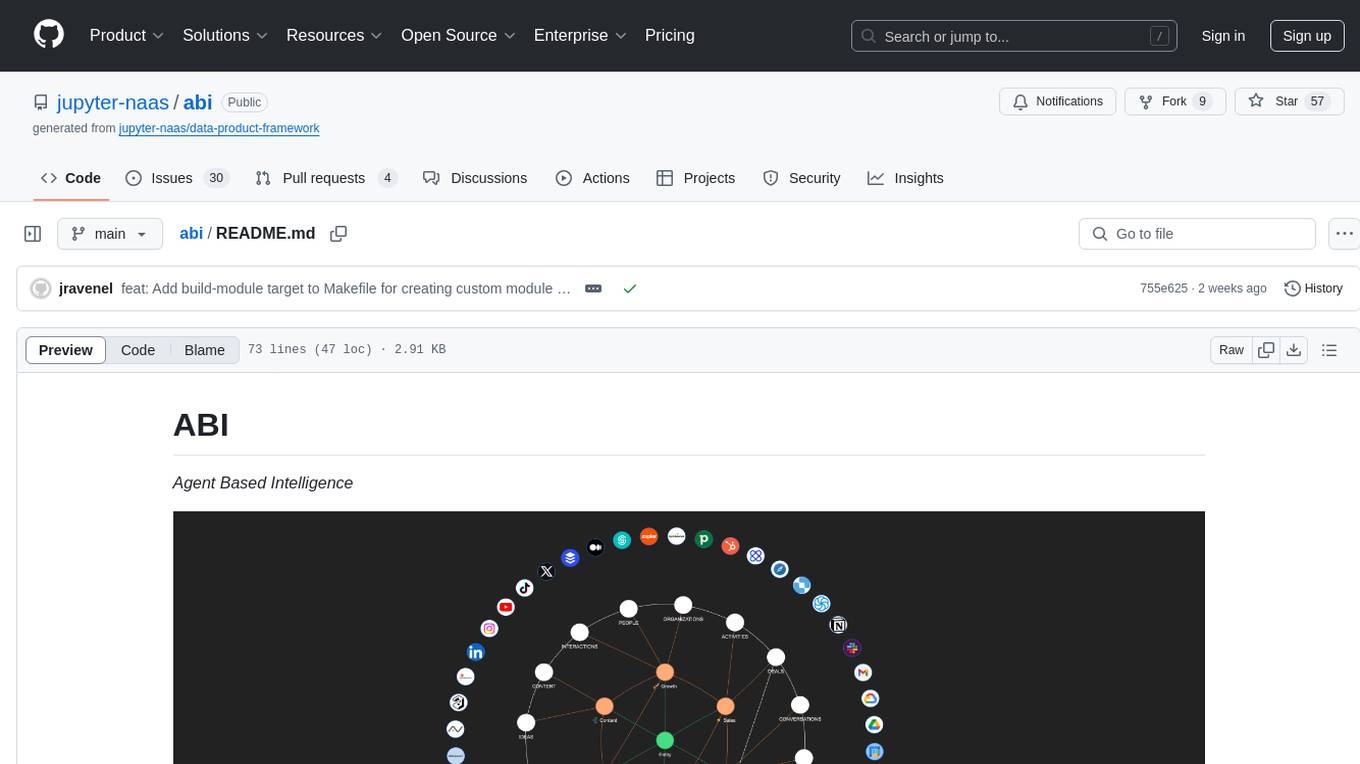
abi
ABI (Agentic Brain Infrastructure) is a Python-based AI Operating System designed to serve as the core infrastructure for building an Agentic AI Ontology Engine. It empowers organizations to integrate, manage, and scale AI-driven operations with multiple AI models, focusing on ontology, agent-driven workflows, and analytics. ABI emphasizes modularity and customization, providing a customizable framework aligned with international standards and regulatory frameworks. It offers features such as configurable AI agents, ontology management, integrations with external data sources, data processing pipelines, workflow automation, analytics, and data handling capabilities.
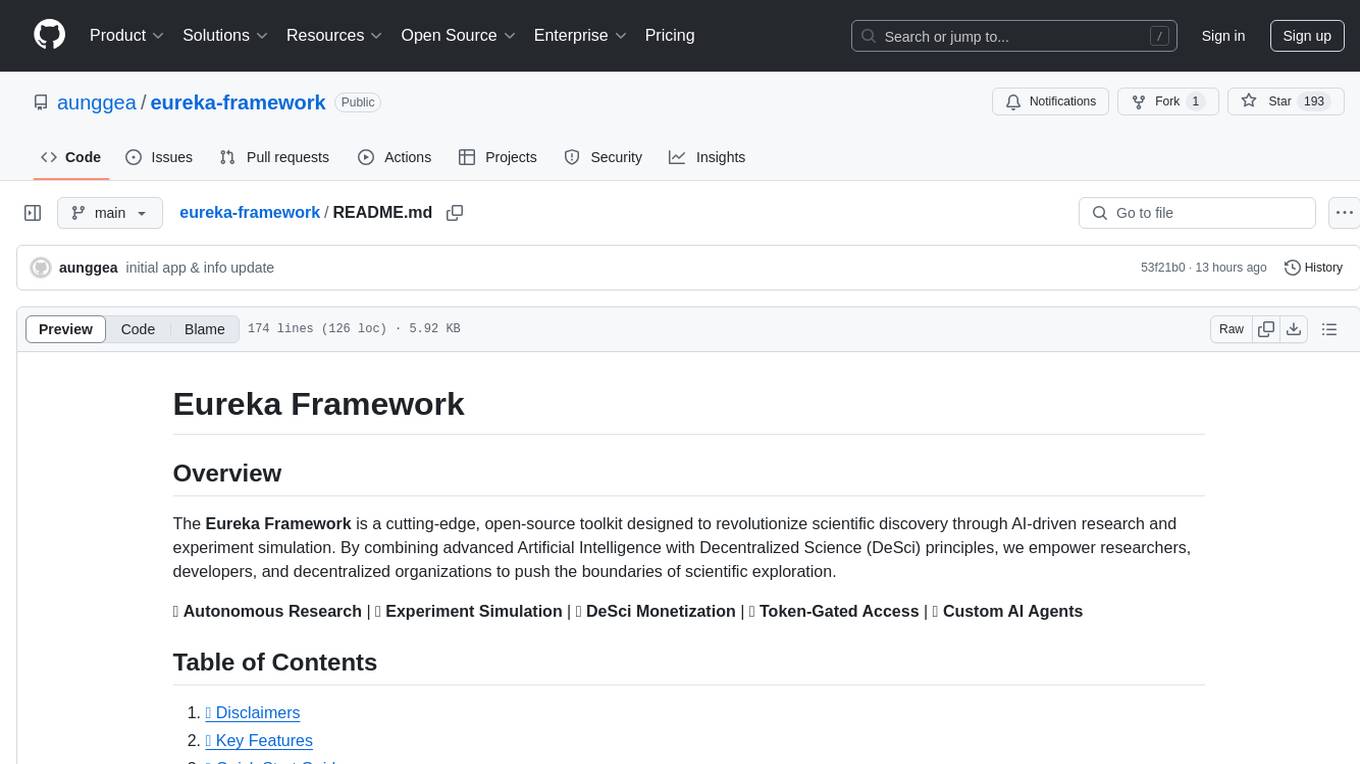
eureka-framework
The Eureka Framework is an open-source toolkit that leverages advanced Artificial Intelligence and Decentralized Science principles to revolutionize scientific discovery. It enables researchers, developers, and decentralized organizations to explore scientific papers, conduct AI-driven experiments, monetize research contributions, provide token-gated access to AI agents, and customize AI agents for specific research domains. The framework also offers features like a RESTful API, robust scheduler for task automation, and webhooks for real-time notifications, empowering users to automate research tasks, enhance productivity, and foster a committed research community.
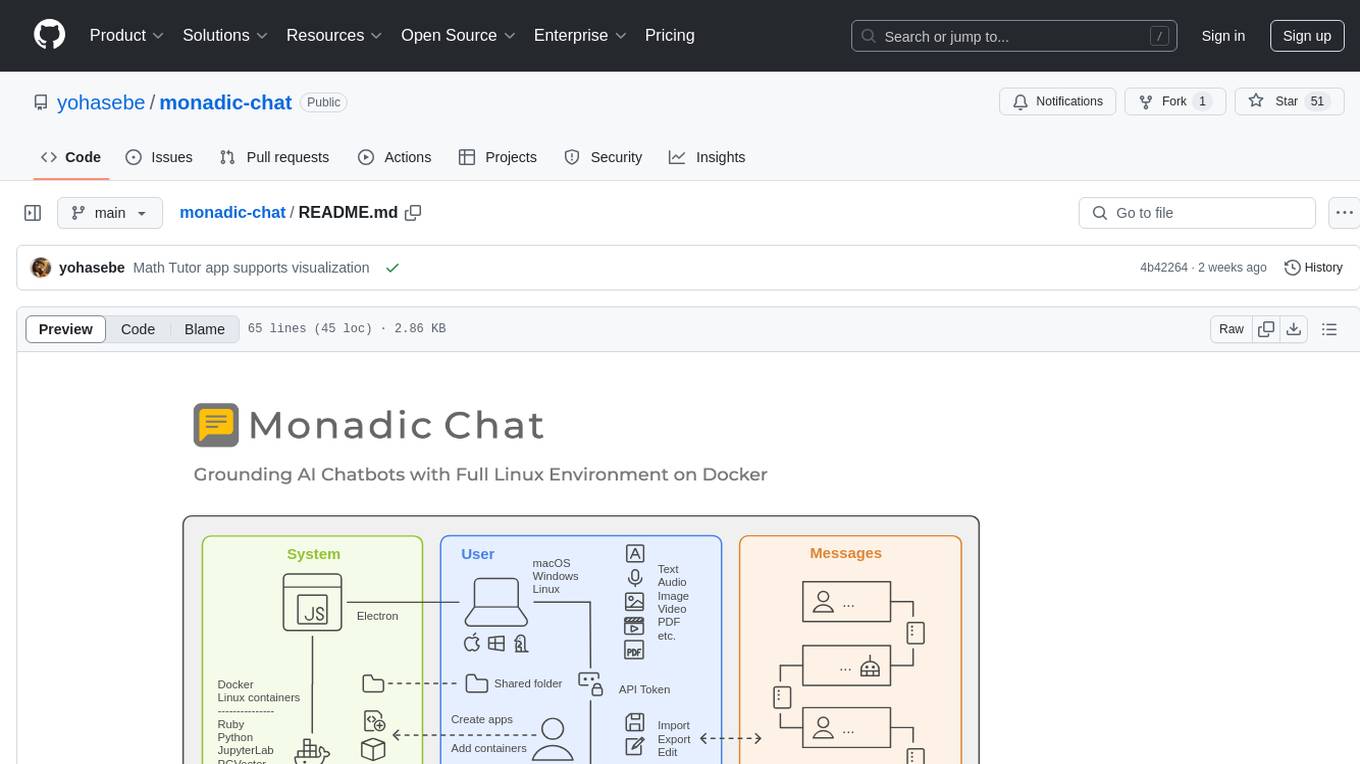
monadic-chat
Monadic Chat is a locally hosted web application designed to create and utilize intelligent chatbots. It provides a Linux environment on Docker to GPT and other LLMs, enabling the execution of advanced tasks that require external tools. The tool supports voice interaction, image and video recognition and generation, and AI-to-AI chat, making it useful for using AI and developing various applications. It is available for Mac, Windows, and Linux (Debian/Ubuntu) with easy-to-use installers.
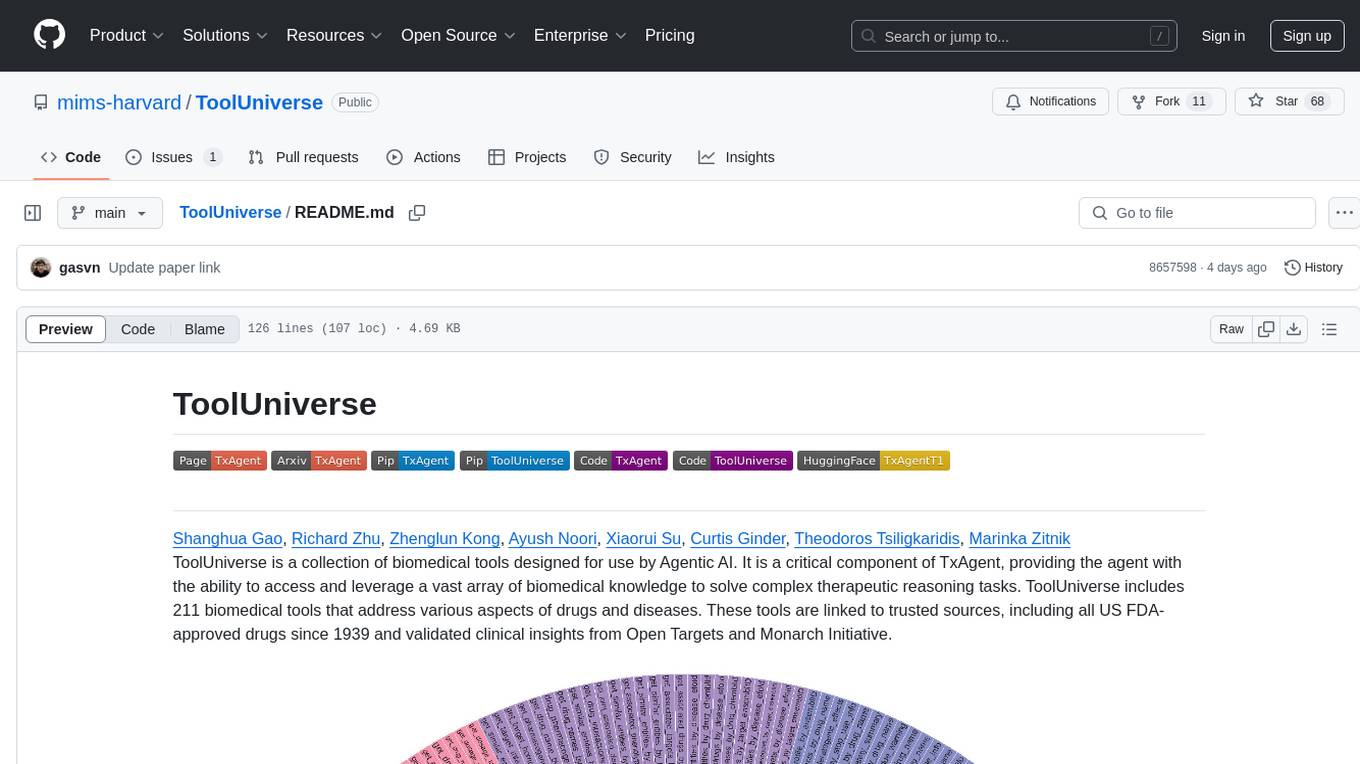
ToolUniverse
ToolUniverse is a collection of 211 biomedical tools designed for Agentic AI, providing access to biomedical knowledge for solving therapeutic reasoning tasks. The tools cover various aspects of drugs and diseases, linked to trusted sources like US FDA-approved drugs since 1939, Open Targets, and Monarch Initiative.
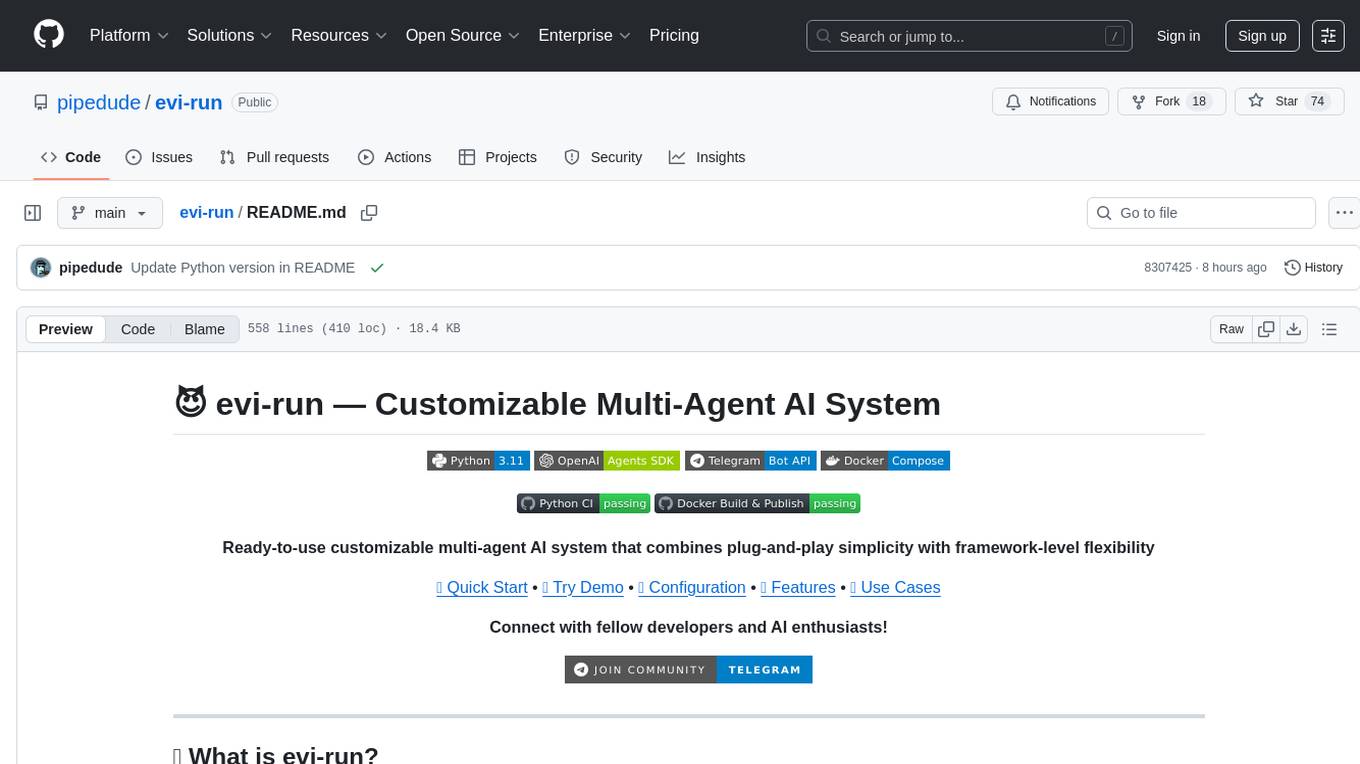
evi-run
evi-run is a powerful, production-ready multi-agent AI system built on Python using the OpenAI Agents SDK. It offers instant deployment, ultimate flexibility, built-in analytics, Telegram integration, and scalable architecture. The system features memory management, knowledge integration, task scheduling, multi-agent orchestration, custom agent creation, deep research, web intelligence, document processing, image generation, DEX analytics, and Solana token swap. It supports flexible usage modes like private, free, and pay mode, with upcoming features including NSFW mode, task scheduler, and automatic limit orders. The technology stack includes Python 3.11, OpenAI Agents SDK, Telegram Bot API, PostgreSQL, Redis, and Docker & Docker Compose for deployment.
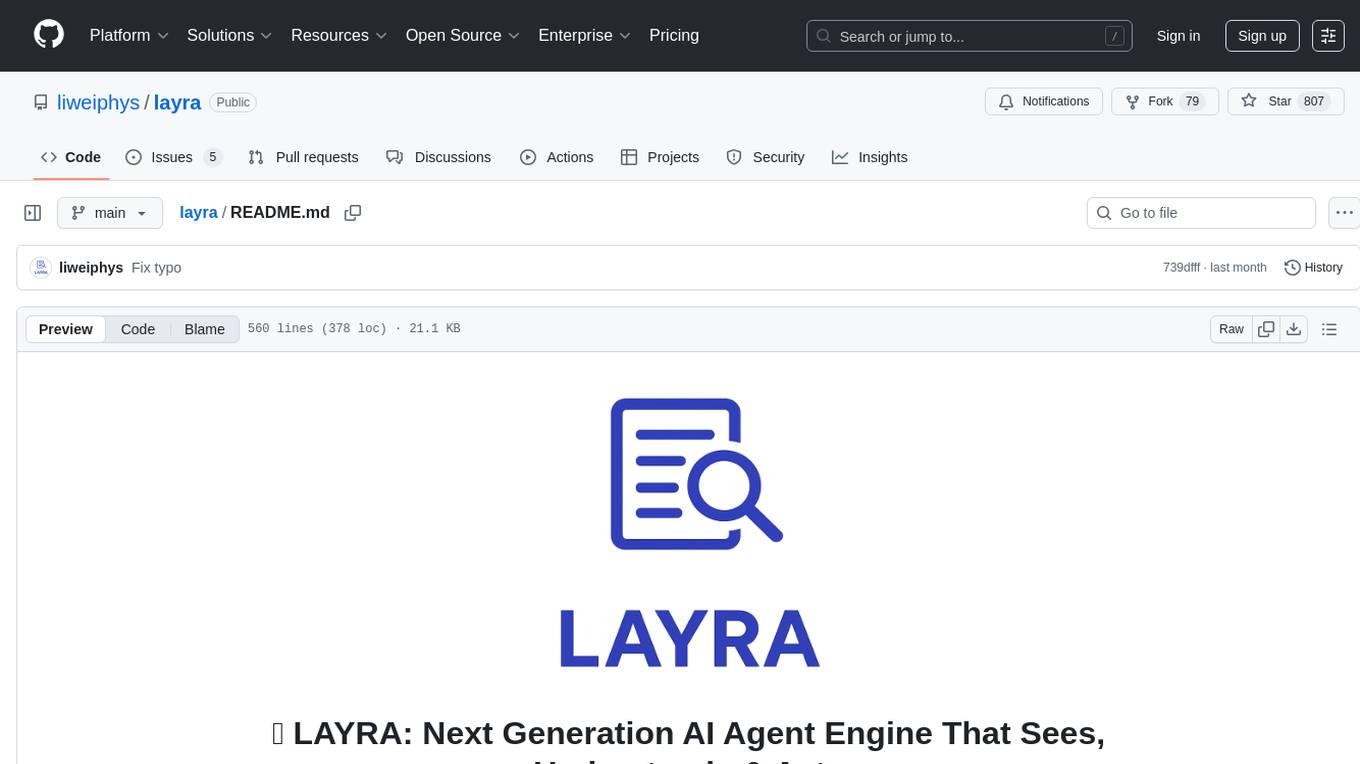
layra
LAYRA is the world's first visual-native AI automation engine that sees documents like a human, preserves layout and graphical elements, and executes arbitrarily complex workflows with full Python control. It empowers users to build next-generation intelligent systems with no limits or compromises. Built for Enterprise-Grade deployment, LAYRA features a modern frontend, high-performance backend, decoupled service architecture, visual-native multimodal document understanding, and a powerful workflow engine.
For similar tasks
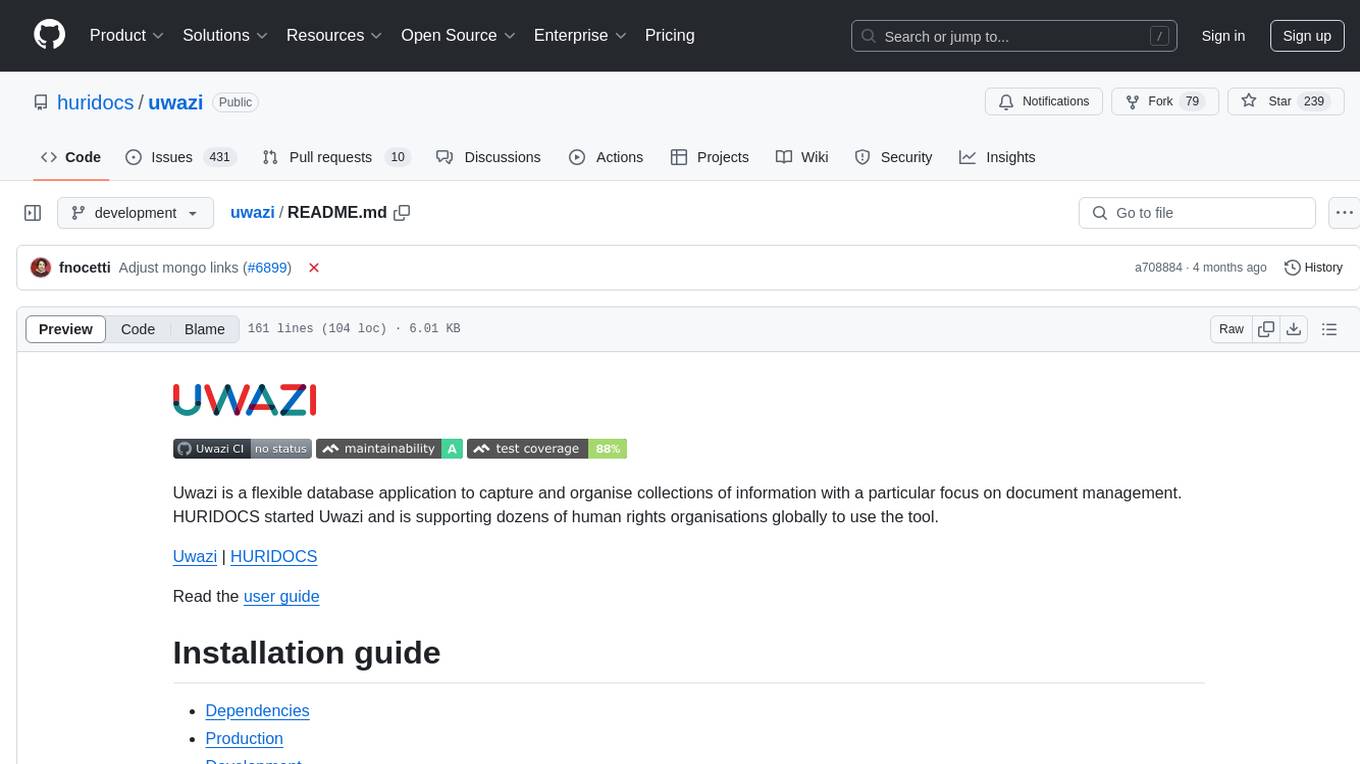
uwazi
Uwazi is a flexible database application designed for capturing and organizing collections of information, with a focus on document management. It is developed and supported by HURIDOCS, benefiting human rights organizations globally. The tool requires NodeJs, ElasticSearch, ICU Analysis Plugin, MongoDB, Yarn, and pdftotext for installation. It offers production and development installation guides, including Docker setup. Uwazi supports hot reloading, unit and integration testing with JEST, and end-to-end testing with Nightmare or Puppeteer. The system requirements include RAM, CPU, and disk space recommendations for on-premises and development usage.

Zettelgarden
Zettelgarden is a human-centric, open-source personal knowledge management system that helps users develop and maintain their understanding of the world. It focuses on creating and connecting atomic notes, thoughtful AI integration, and scalability from personal notes to company knowledge bases. The project is actively evolving, with features subject to change based on community feedback and development priorities.
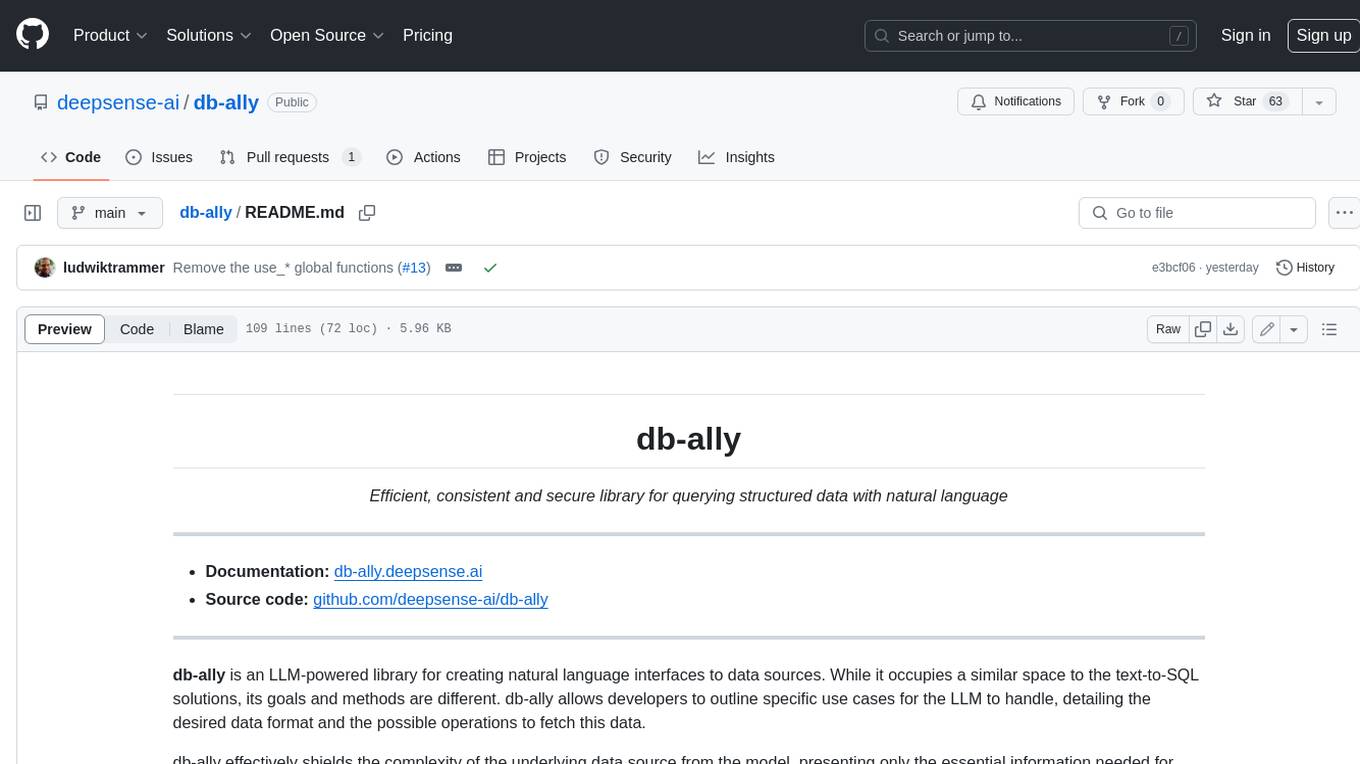
db-ally
db-ally is a library for creating natural language interfaces to data sources. It allows developers to outline specific use cases for a large language model (LLM) to handle, detailing the desired data format and the possible operations to fetch this data. db-ally effectively shields the complexity of the underlying data source from the model, presenting only the essential information needed for solving the specific use cases. Instead of generating arbitrary SQL, the model is asked to generate responses in a simplified query language.
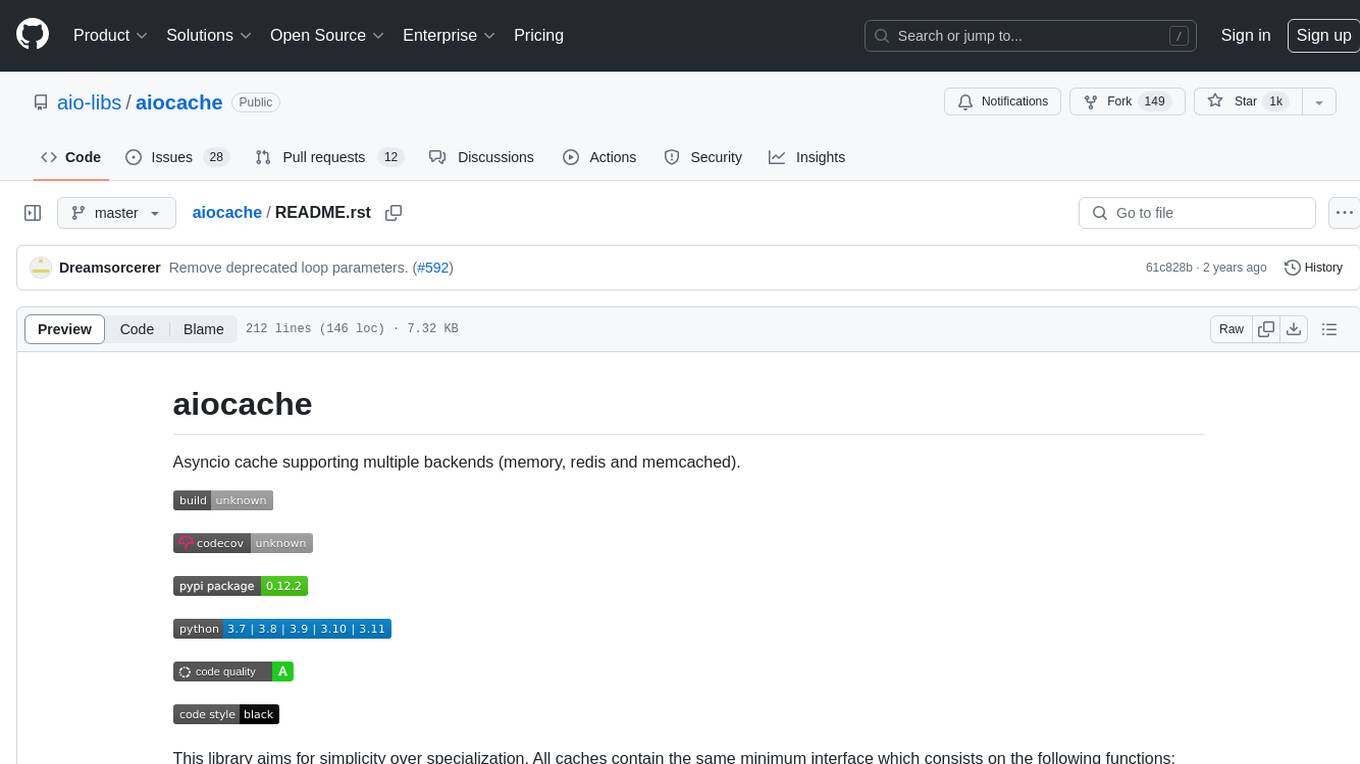
aiocache
Aiocache is an asyncio cache library that supports multiple backends such as memory, redis, and memcached. It provides a simple interface for functions like add, get, set, multi_get, multi_set, exists, increment, delete, clear, and raw. Users can easily install and use the library for caching data in Python applications. Aiocache allows for easy instantiation of caches and setup of cache aliases for reusing configurations. It also provides support for backends, serializers, and plugins to customize cache operations. The library offers detailed documentation and examples for different use cases and configurations.
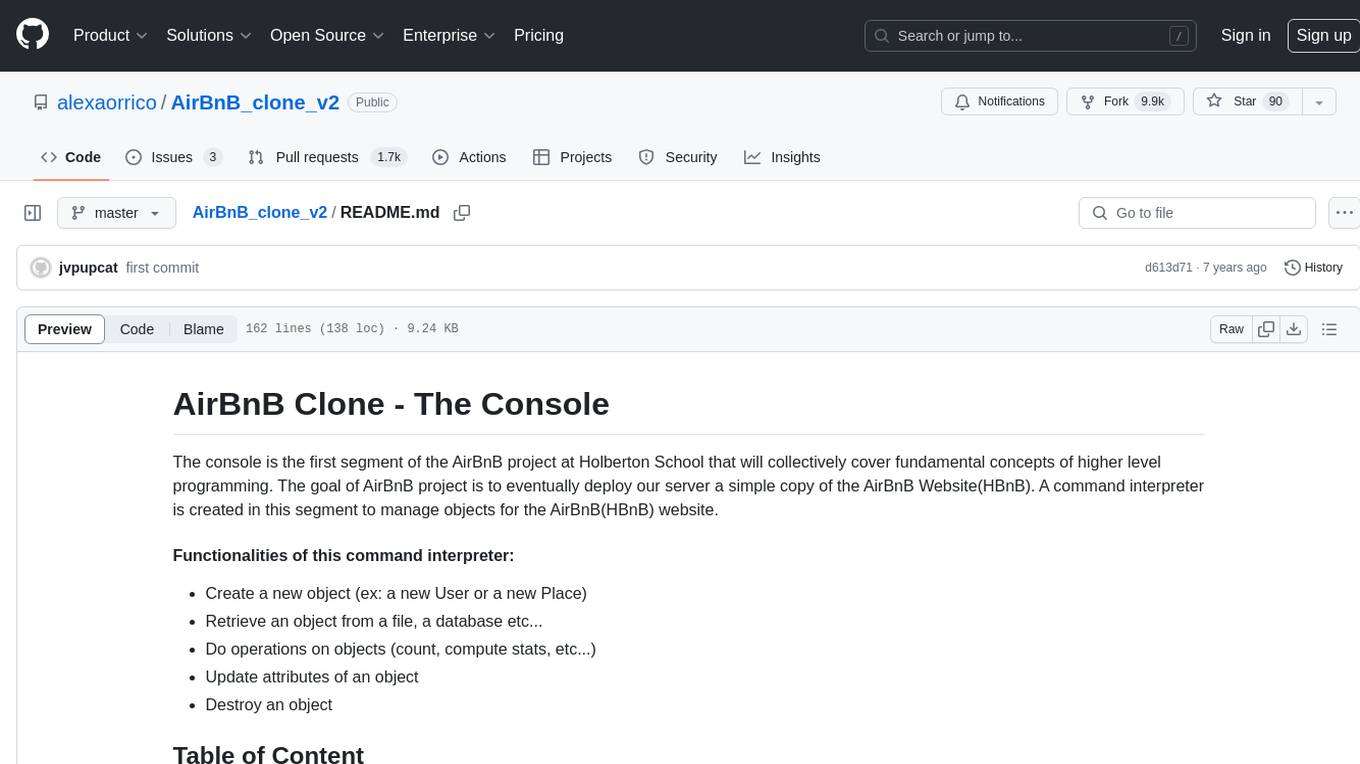
AirBnB_clone_v2
The AirBnB Clone - The Console project is the first segment of the AirBnB project at Holberton School, aiming to cover fundamental concepts of higher level programming. The goal is to deploy a server as a simple copy of the AirBnB Website (HBnB). The project includes a command interpreter to manage objects for the AirBnB website, allowing users to create new objects, retrieve objects, perform operations on objects, update object attributes, and destroy objects. The project is interpreted/tested on Ubuntu 14.04 LTS using Python 3.4.3.
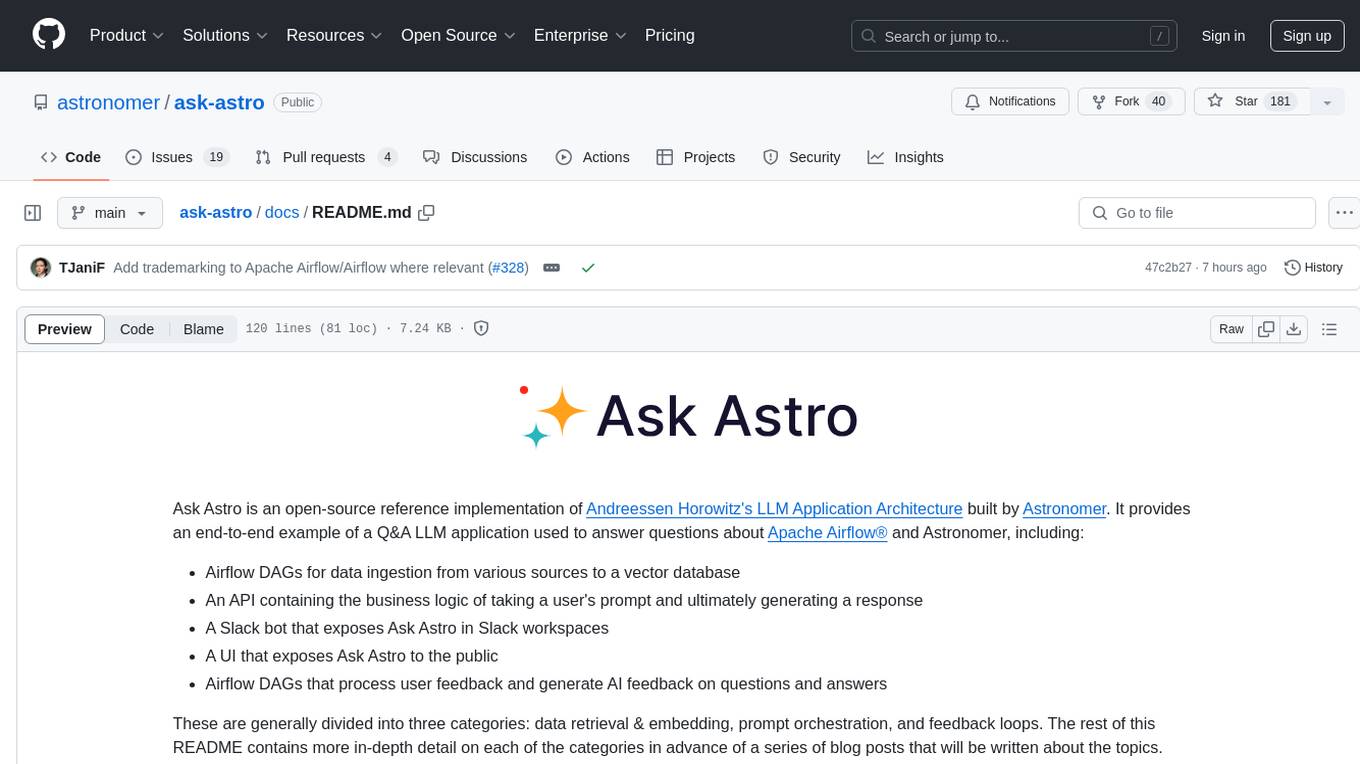
ask-astro
Ask Astro is an open-source reference implementation of Andreessen Horowitz's LLM Application Architecture built by Astronomer. It provides an end-to-end example of a Q&A LLM application used to answer questions about Apache Airflow® and Astronomer. Ask Astro includes Airflow DAGs for data ingestion, an API for business logic, a Slack bot, a public UI, and DAGs for processing user feedback. The tool is divided into data retrieval & embedding, prompt orchestration, and feedback loops.
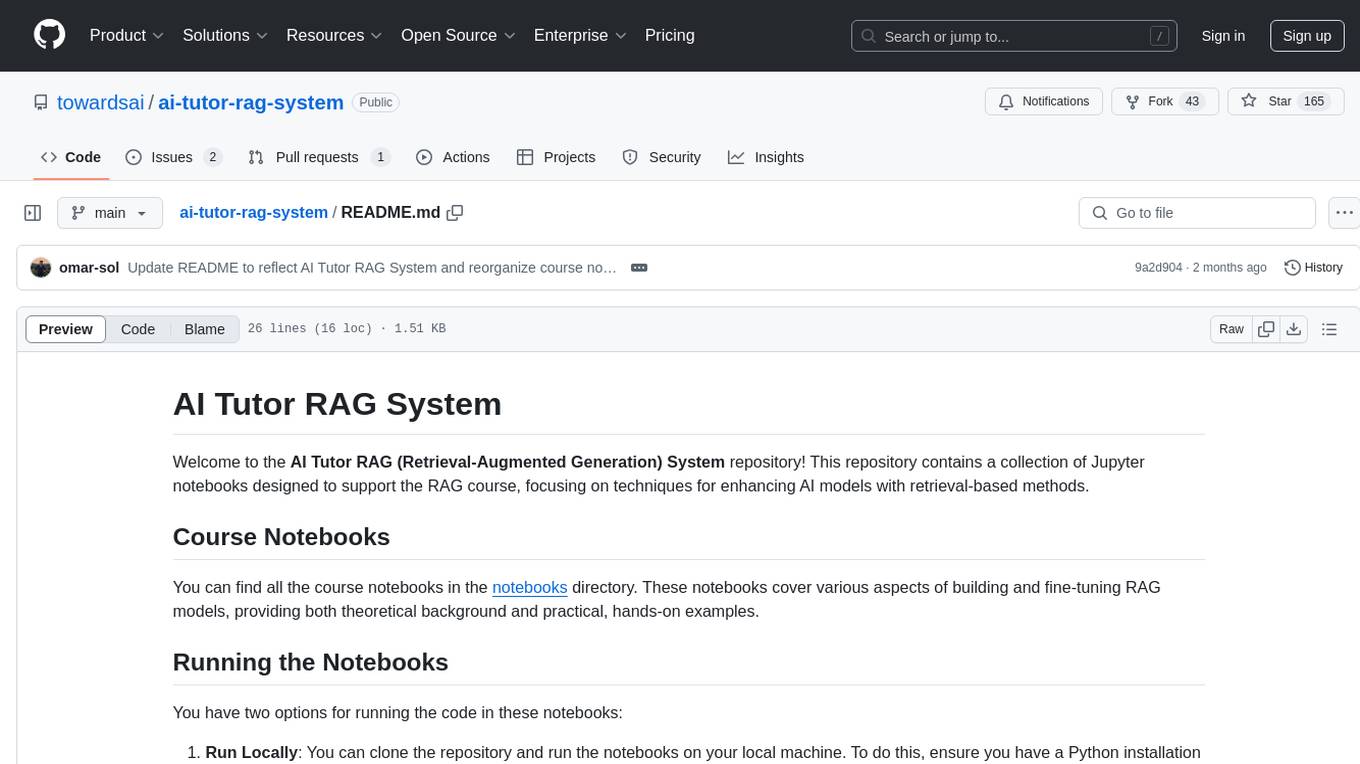
ai-tutor-rag-system
The AI Tutor RAG System repository contains Jupyter notebooks supporting the RAG course, focusing on enhancing AI models with retrieval-based methods. It covers foundational and advanced concepts in retrieval-augmented generation, including data retrieval techniques, model integration with retrieval systems, and practical applications of RAG in real-world scenarios.
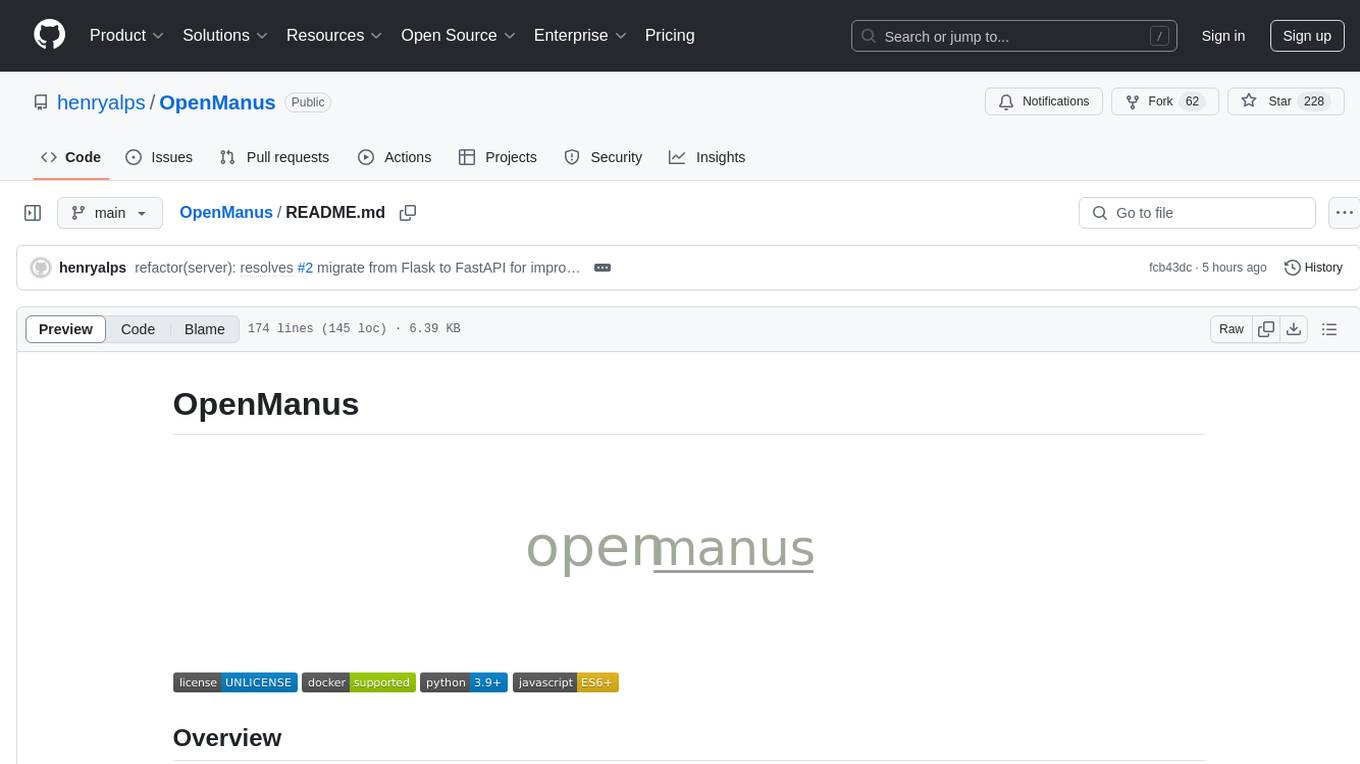
OpenManus
OpenManus is an open-source project aiming to replicate the capabilities of the Manus AI agent, known for autonomously executing complex tasks like travel planning and stock analysis. The project provides a modular, containerized framework using Docker, Python, and JavaScript, allowing developers to build, deploy, and experiment with a multi-agent AI system. Features include collaborative AI agents, Dockerized environment, task execution support, tool integration, modular design, and community-driven development. Users can interact with OpenManus via CLI, API, or web UI, and the project welcomes contributions to enhance its capabilities.
For similar jobs
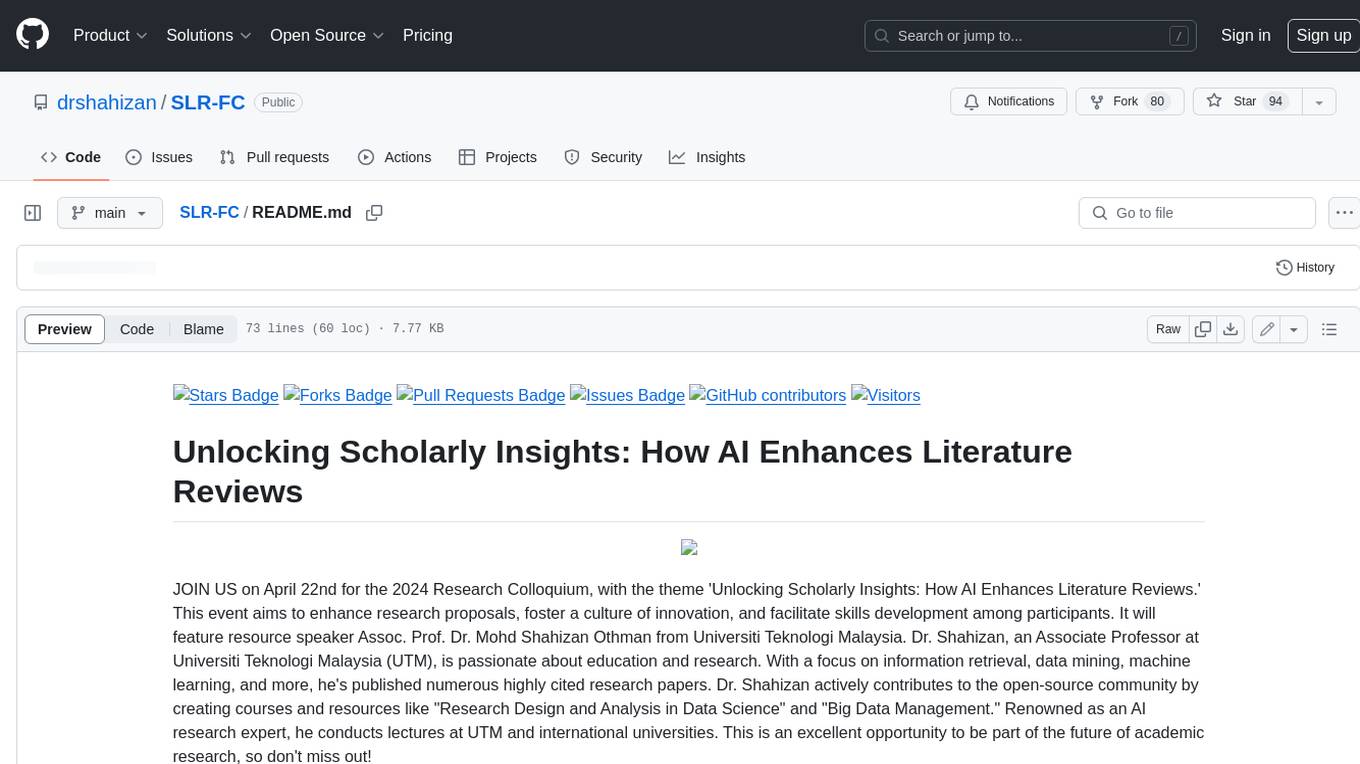
SLR-FC
This repository provides a comprehensive collection of AI tools and resources to enhance literature reviews. It includes a curated list of AI tools for various tasks, such as identifying research gaps, discovering relevant papers, visualizing paper content, and summarizing text. Additionally, the repository offers materials on generative AI, effective prompts, copywriting, image creation, and showcases of AI capabilities. By leveraging these tools and resources, researchers can streamline their literature review process, gain deeper insights from scholarly literature, and improve the quality of their research outputs.
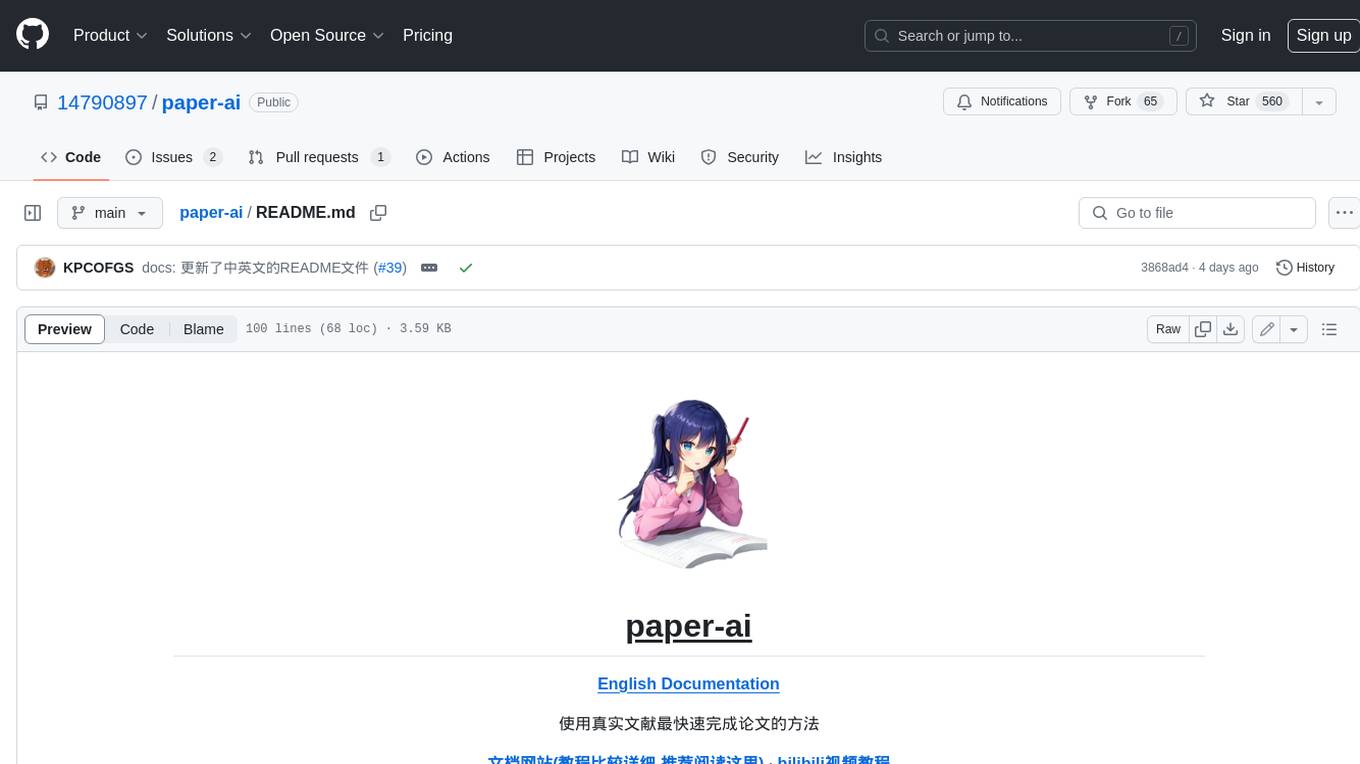
paper-ai
Paper-ai is a tool that helps you write papers using artificial intelligence. It provides features such as AI writing assistance, reference searching, and editing and formatting tools. With Paper-ai, you can quickly and easily create high-quality papers.
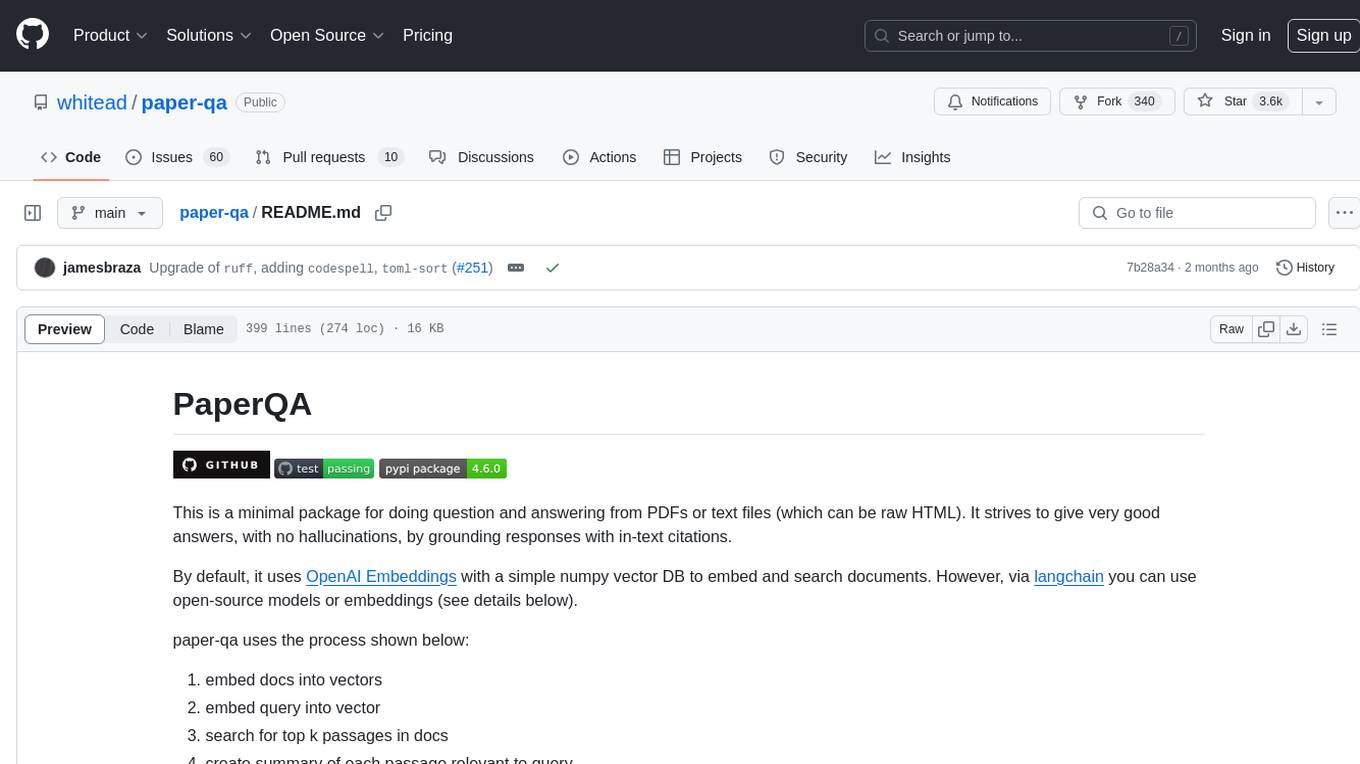
paper-qa
PaperQA is a minimal package for question and answering from PDFs or text files, providing very good answers with in-text citations. It uses OpenAI Embeddings to embed and search documents, and follows a process of embedding docs and queries, searching for top passages, creating summaries, scoring and selecting relevant summaries, putting summaries into prompt, and generating answers. Users can customize prompts and use various models for embeddings and LLMs. The tool can be used asynchronously and supports adding documents from paths, files, or URLs.
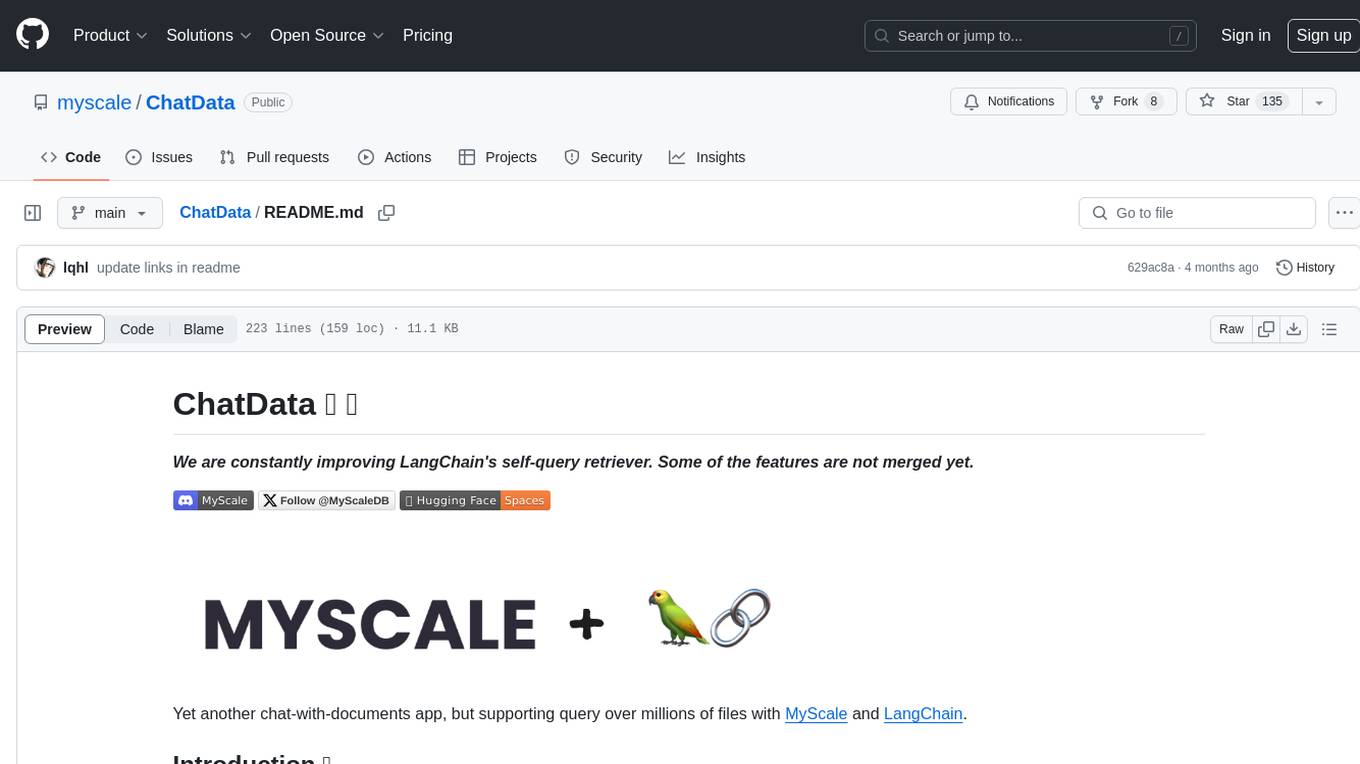
ChatData
ChatData is a robust chat-with-documents application designed to extract information and provide answers by querying the MyScale free knowledge base or uploaded documents. It leverages the Retrieval Augmented Generation (RAG) framework, millions of Wikipedia pages, and arXiv papers. Features include self-querying retriever, VectorSQL, session management, and building a personalized knowledge base. Users can effortlessly navigate vast data, explore academic papers, and research documents. ChatData empowers researchers, students, and knowledge enthusiasts to unlock the true potential of information retrieval.
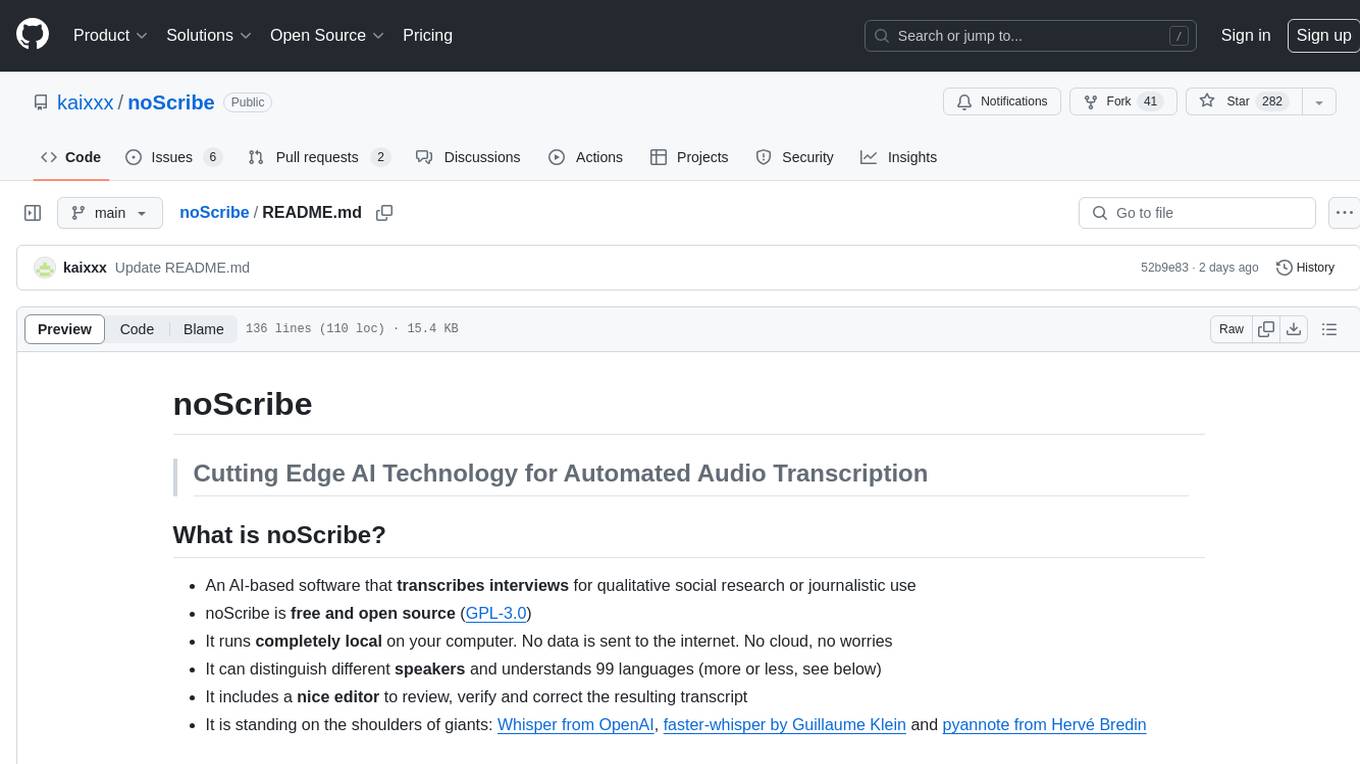
noScribe
noScribe is an AI-based software designed for automated audio transcription, specifically tailored for transcribing interviews for qualitative social research or journalistic purposes. It is a free and open-source tool that runs locally on the user's computer, ensuring data privacy. The software can differentiate between speakers and supports transcription in 99 languages. It includes a user-friendly editor for reviewing and correcting transcripts. Developed by Kai Dröge, a PhD in sociology with a background in computer science, noScribe aims to streamline the transcription process and enhance the efficiency of qualitative analysis.
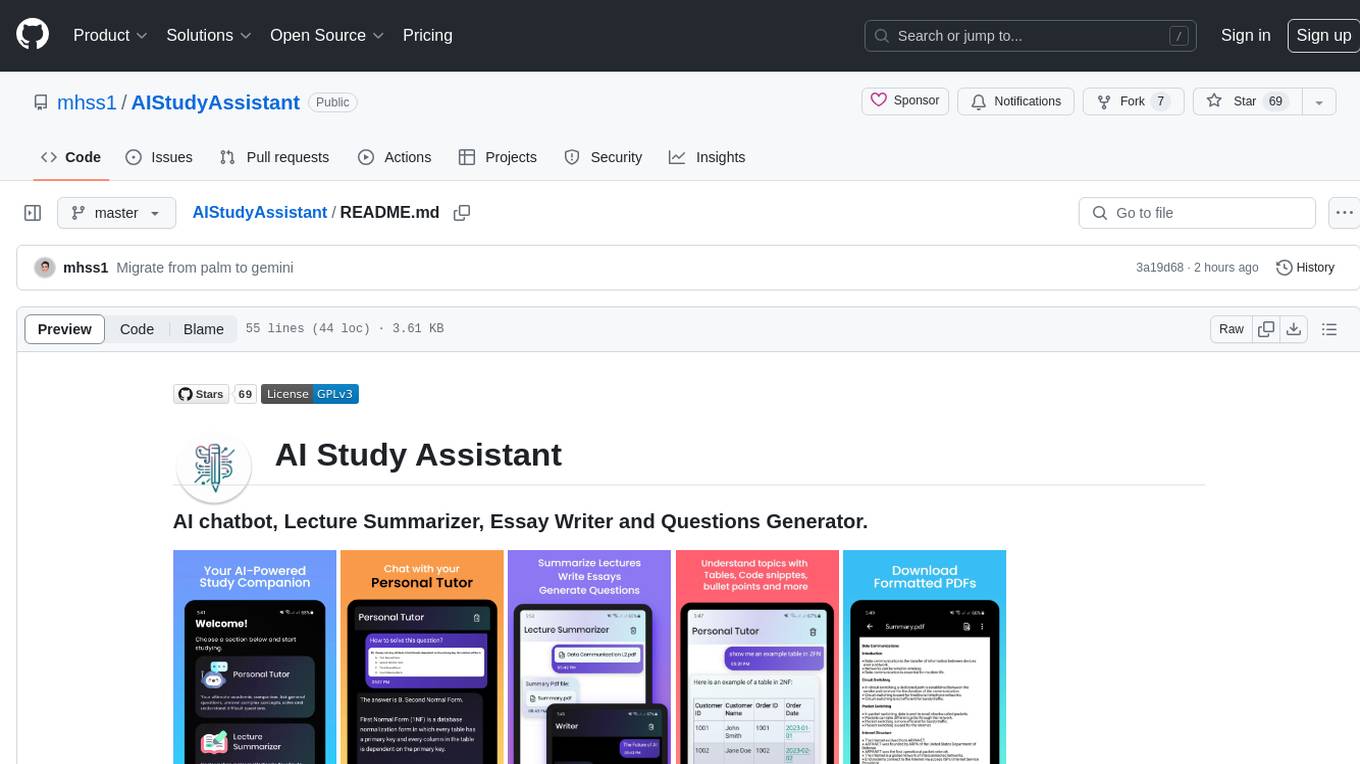
AIStudyAssistant
AI Study Assistant is an app designed to enhance learning experience and boost academic performance. It serves as a personal tutor, lecture summarizer, writer, and question generator powered by Google PaLM 2. Features include interacting with an AI chatbot, summarizing lectures, generating essays, and creating practice questions. The app is built using 100% Kotlin, Jetpack Compose, Clean Architecture, and MVVM design pattern, with technologies like Ktor, Room DB, Hilt, and Kotlin coroutines. AI Study Assistant aims to provide comprehensive AI-powered assistance for students in various academic tasks.
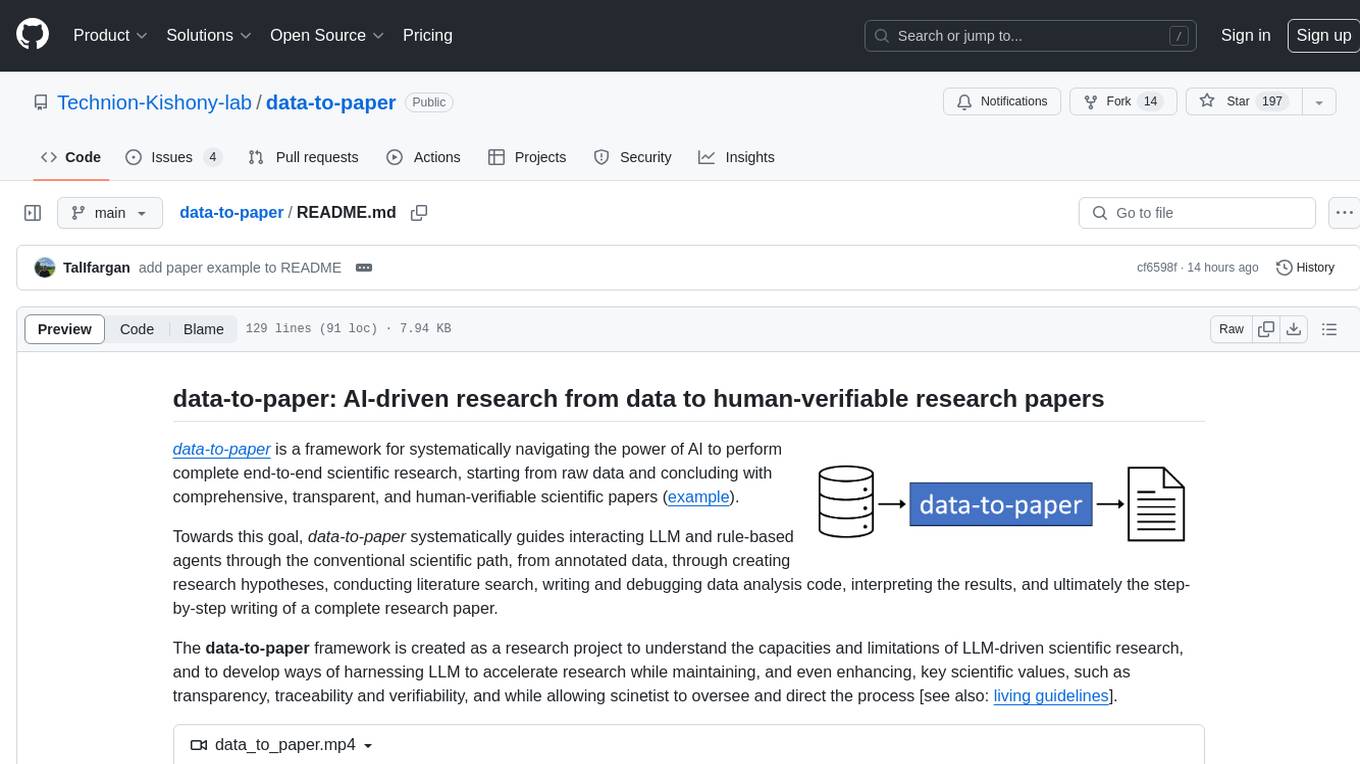
data-to-paper
Data-to-paper is an AI-driven framework designed to guide users through the process of conducting end-to-end scientific research, starting from raw data to the creation of comprehensive and human-verifiable research papers. The framework leverages a combination of LLM and rule-based agents to assist in tasks such as hypothesis generation, literature search, data analysis, result interpretation, and paper writing. It aims to accelerate research while maintaining key scientific values like transparency, traceability, and verifiability. The framework is field-agnostic, supports both open-goal and fixed-goal research, creates data-chained manuscripts, involves human-in-the-loop interaction, and allows for transparent replay of the research process.
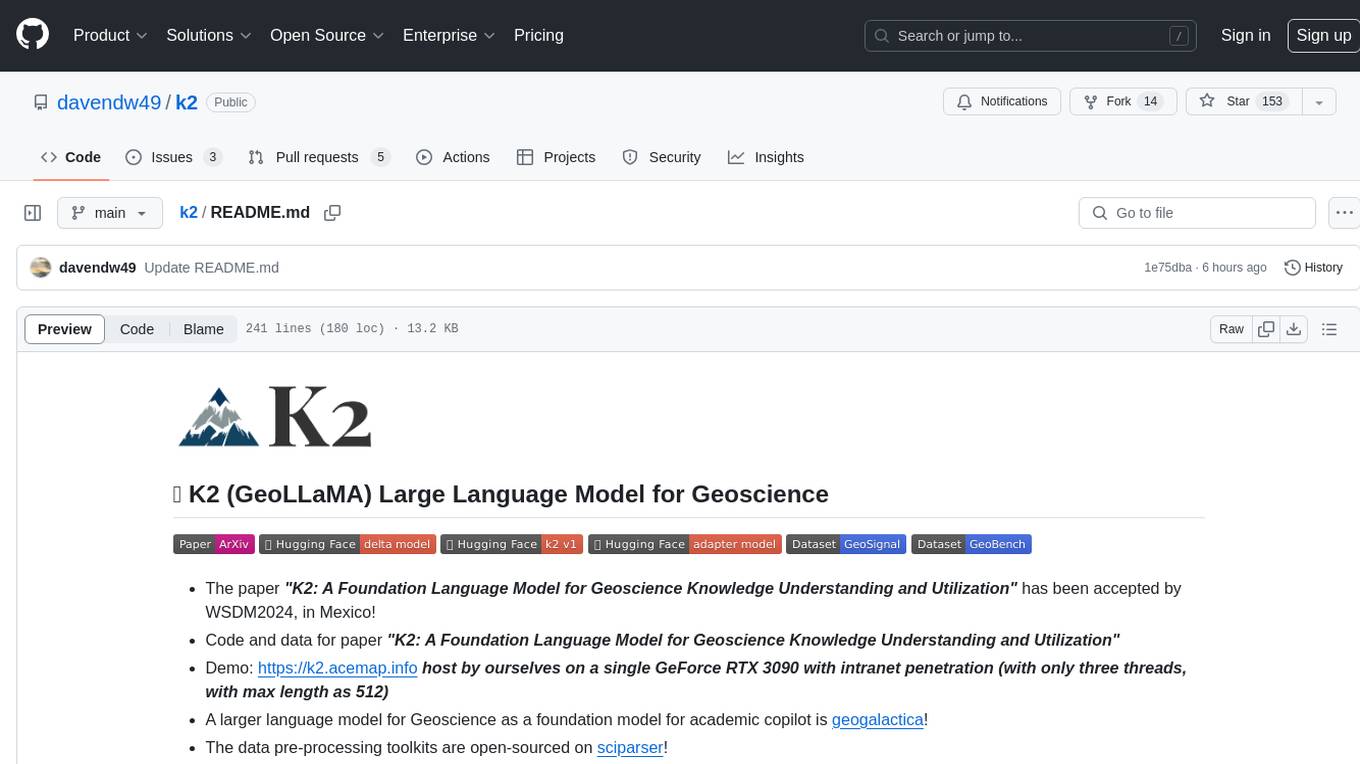
k2
K2 (GeoLLaMA) is a large language model for geoscience, trained on geoscience literature and fine-tuned with knowledge-intensive instruction data. It outperforms baseline models on objective and subjective tasks. The repository provides K2 weights, core data of GeoSignal, GeoBench benchmark, and code for further pretraining and instruction tuning. The model is available on Hugging Face for use. The project aims to create larger and more powerful geoscience language models in the future.